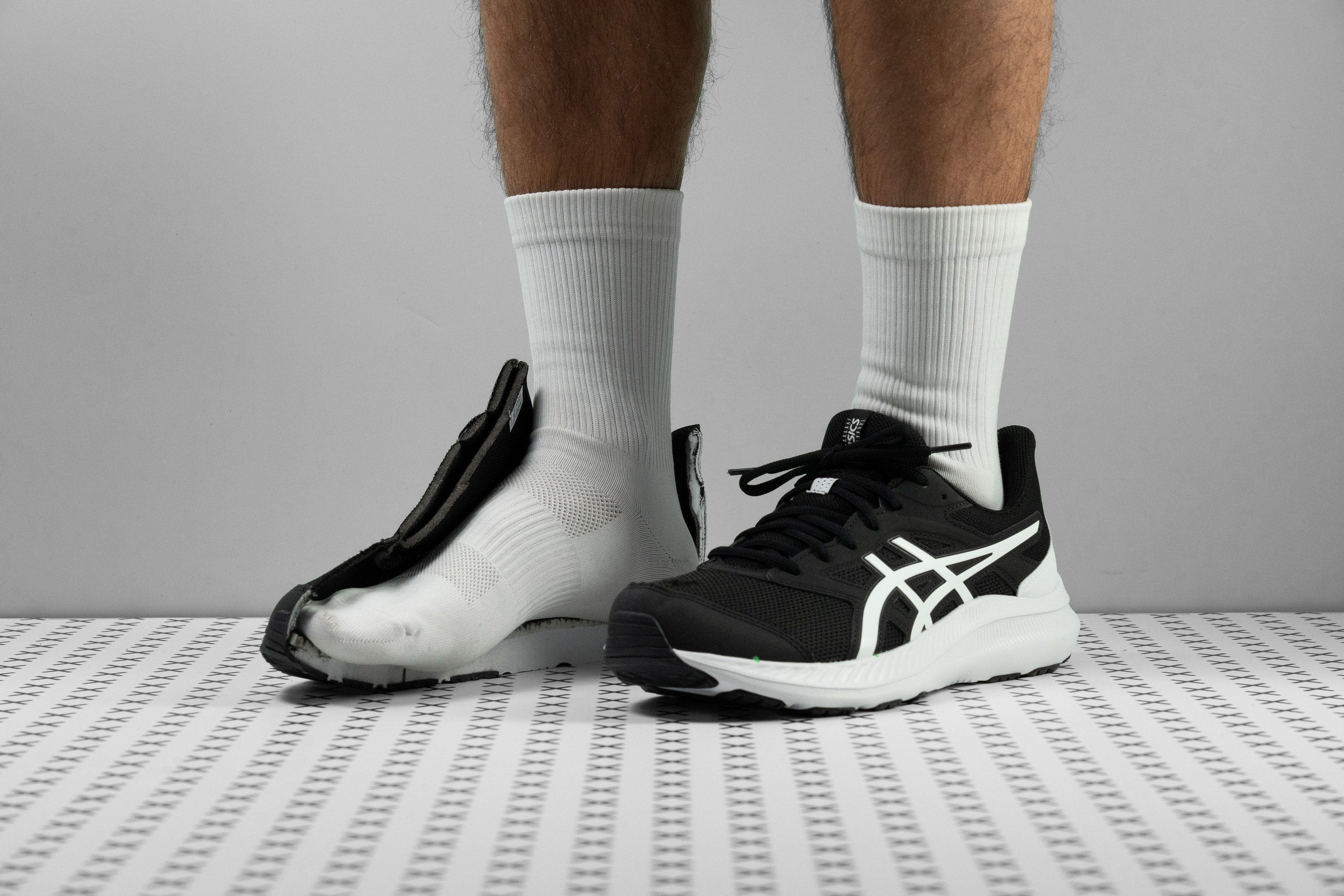Our verdict
Pros
- Extremely breathable
- Flexible and forgiving
- Feels stable underfoot
- Durable outsole
- Performs consistently in the cold
- Works well for walking or gym days
- Budget-friendly
Cons
- Could be lighter
- Cushioning on the firm side
- Not responsive enough
Audience verdict
Comparison
The most similar running shoes compared
+ + Add a shoe | |||||
|---|---|---|---|---|---|
| Audience score | 79 Good! | 79 Good! | 79 Good! | 81 Good! | |
| Price | $60 | $70 | $70 | $75 | |
| Pace | Daily running | Daily running | Daily running | Daily running | |
| Shock absorption | Low | - | Moderate | Low | |
| Energy return | Low | - | Low | Low | |
| Traction | Moderate | - | Moderate | Moderate | |
| Arch support | Neutral | Neutral | Neutral | Neutral | |
| Weight lab Weight brand | 9.1 oz / 259g 9.5 oz / 268g | 9.3 oz / 264g 10 oz / 283g | 9.7 oz / 275g 9.7 oz / 275g | 10.5 oz / 298g 9.9 oz / 280g | |
| Drop lab Drop brand | 9.4 mm 8.0 mm | 9.6 mm 8.0 mm | 7.8 mm 8.0 mm | 9.4 mm 10.0 mm | |
| Strike pattern | HeelMid/forefoot | HeelMid/forefoot | Mid/forefoot | HeelMid/forefoot | |
| Size | True to size | Slightly small | True to size | Slightly small | |
| Midsole softness | Balanced | Balanced | Balanced | Firm | |
| Difference in midsole softness in cold | Small | Normal | Small | Small | |
| Toebox durability | Bad | Decent | Bad | Bad | |
| Heel padding durability | Decent | Bad | Good | Bad | |
| Outsole durability | Good | Decent | Decent | - | |
| Breathability | Breathable | Moderate | Moderate | Moderate | |
| Width / fit | Medium | Medium | Medium | Medium | |
| Toebox width | Wide | Wide | Medium | Medium | |
| Stiffness | Moderate | Moderate | Moderate | Moderate | |
| Torsional rigidity | Stiff | Moderate | Moderate | Moderate | |
| Heel counter stiffness | Stiff | Moderate | Stiff | Moderate | |
| Heel lab Heel brand | 31.6 mm | 30.8 mm 30.0 mm | 31.2 mm 31.0 mm | 32.0 mm | |
| Forefoot lab Forefoot brand | 22.2 mm | 21.2 mm 22.0 mm | 23.4 mm 23.0 mm | 22.6 mm | |
| Widths available | NormalX-Wide | NormalX-Wide | NormalWideX-Wide | NormalWideX-Wide | |
| Orthotic friendly | ✓ | ✓ | ✓ | ✓ | |
| Season | SummerAll seasons | All seasons | All seasons | All seasons | |
| Removable insole | ✓ | ✓ | ✓ | ✓ | |
| Ranking | #333 Bottom 13% | #339 Bottom 11% | #340 Bottom 11% | #301 Bottom 21% | |
| Popularity | #326 Bottom 14% | #292 Bottom 23% | #70 Top 19% | #100 Top 27% |
Who should buy
We recommend the ASICS Jolt 4 as an excellent training companion for:
- Beginner runners looking for a neutral shoe that's also good for walking and gym days
- Heavyset runners or those with mild overpronation who need more firm cushioning for a stable yet protective ride
- Runners in warm climates that need a comfy and breathable shoe
- Those in the market for a wallet-friendly and durable daily trainer that can tackle easy runs
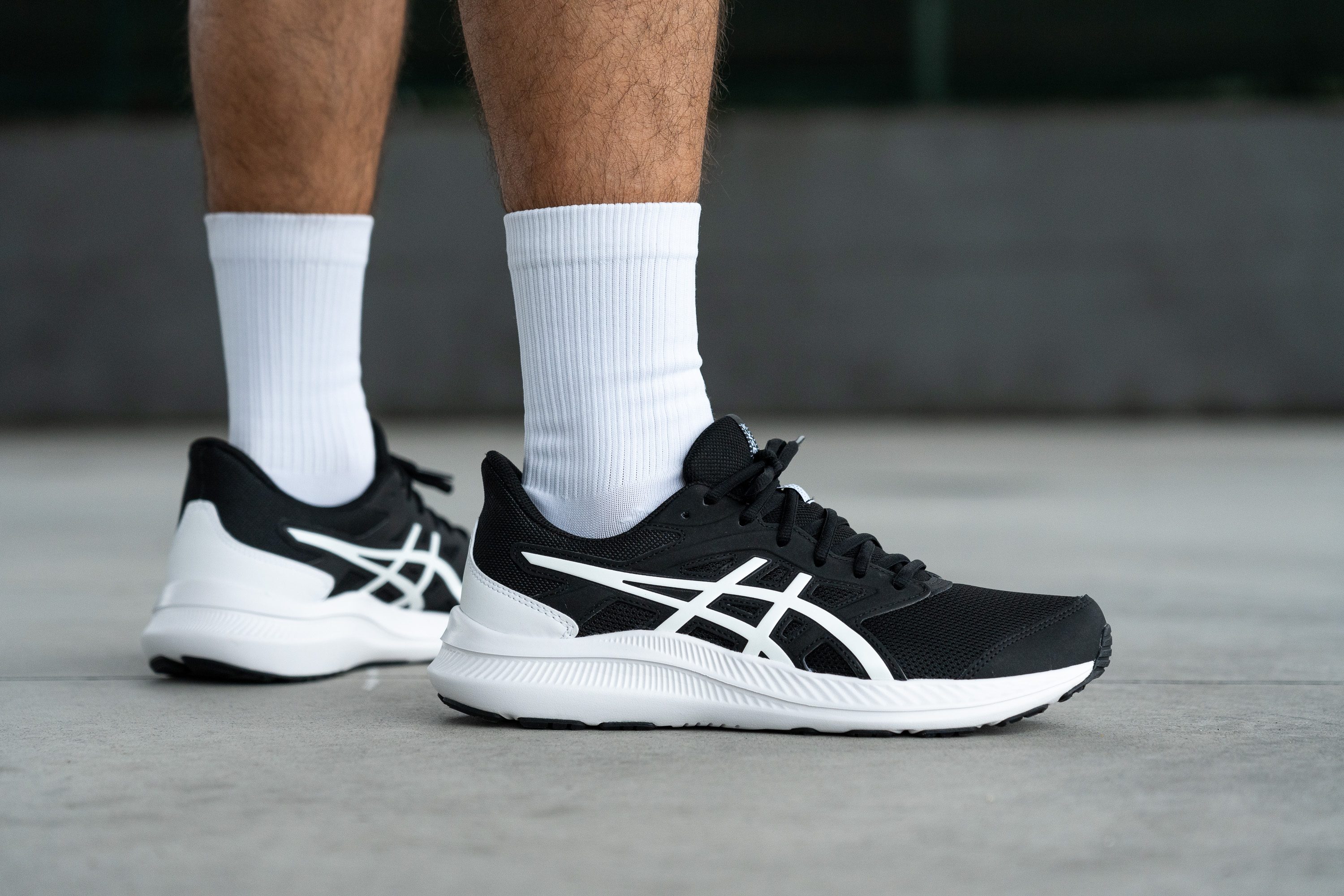
Who should NOT buy
We found the Jolt 4's EVA midsole to be decidedly firm, so those who prefer softer cushioning from their daily trainers will be better served with the plush ASICS Gel Cumulus 25.
The Jolt 4 also lacks the responsiveness to facilitate fast-paced runs. For speedy runners looking to crush their PRs, we recommend triathlon-ready ASICS Gel Noosa Tri 15 instead.
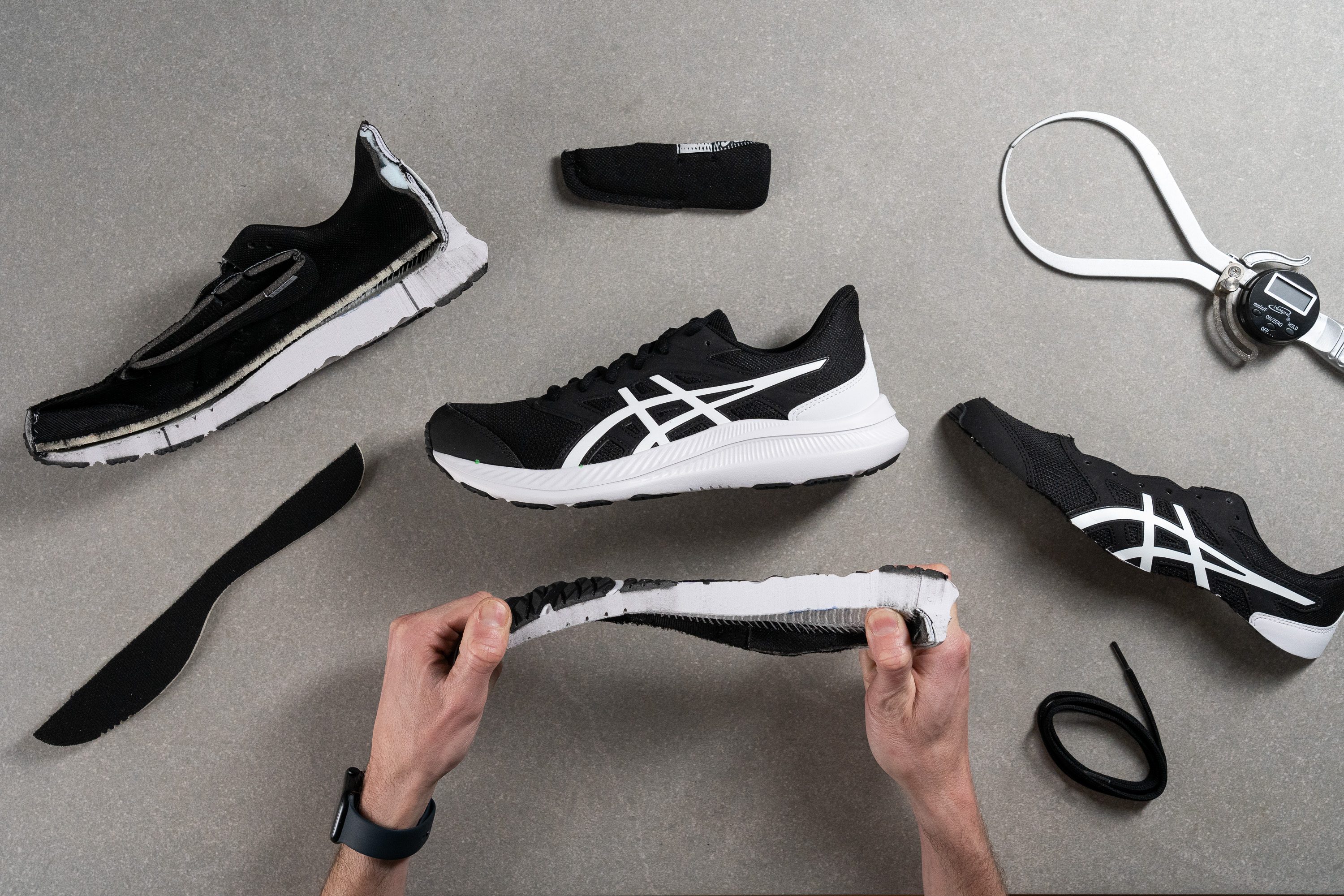
While the Jolt 4 is certainly a stable shoe, we recommend that those with pronounced overpronation in their stride should look into a more supportive daily training option to avoid injury. The ASICS GT 1000 12 or its pricier cousin the ASICS GT 2000 12 are both good stability shoe alternatives.
Cushioning
Shock absorption
Shock absorption isn’t the strongest suit of the Jolt 4—something that’s clear just by looking at it. It scored 106 SA in the heel and only 84 SA in the forefoot, both well below today’s maximalist trend. However, this makes the shoe quite appealing for lighter runners or casual everyday use.
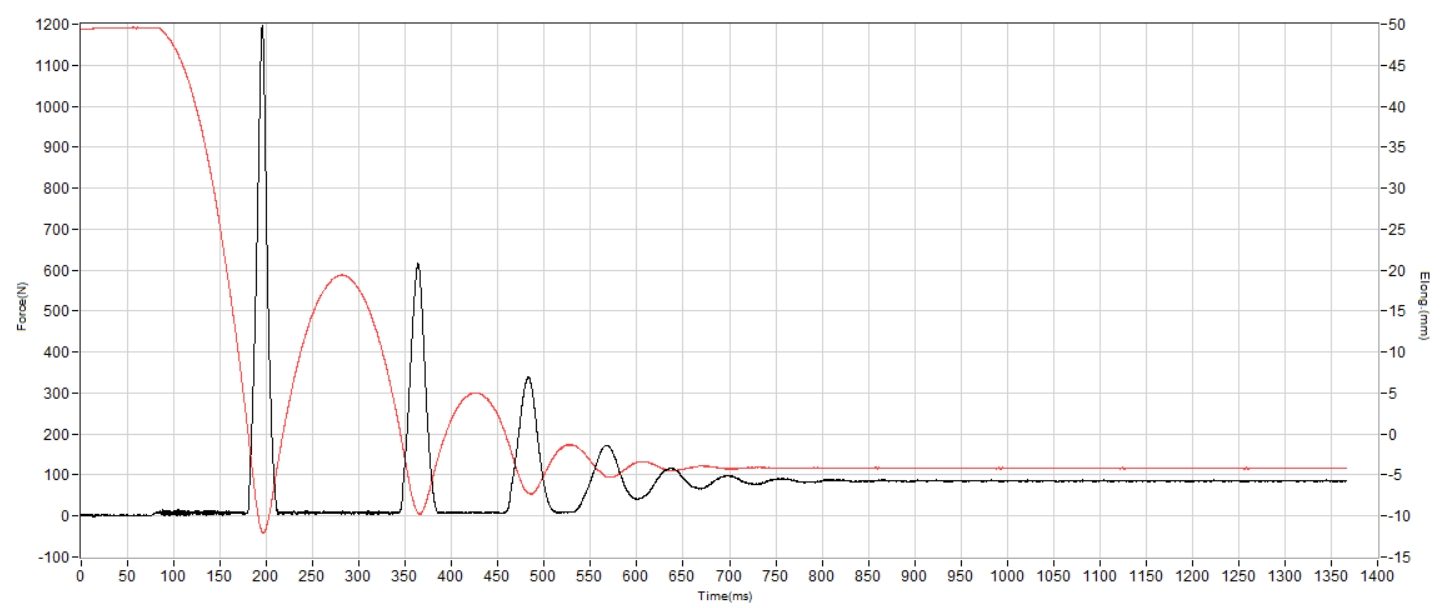
| Jolt 4 | 106 SA |
| Average | 130 SA |
Energy return
We really felt the midsole flat during our runs, and back in the lab, our machine confirmed it: the Jolt 4 delivers just 45.2% energy return. That’s on the lower end, but expected in budget-friendly shoes where cost-cutting comes into play. Foam isn’t cheap!
| Jolt 4 | 45.2% |
| Average | 58.6% |
Heel stack
We measured the Jolt 4's heel stack to be 31.6 mm thick at the heel, which is a hair shy of our current lab average. However, the basic nature of its foam makes it feel even less cushioned.
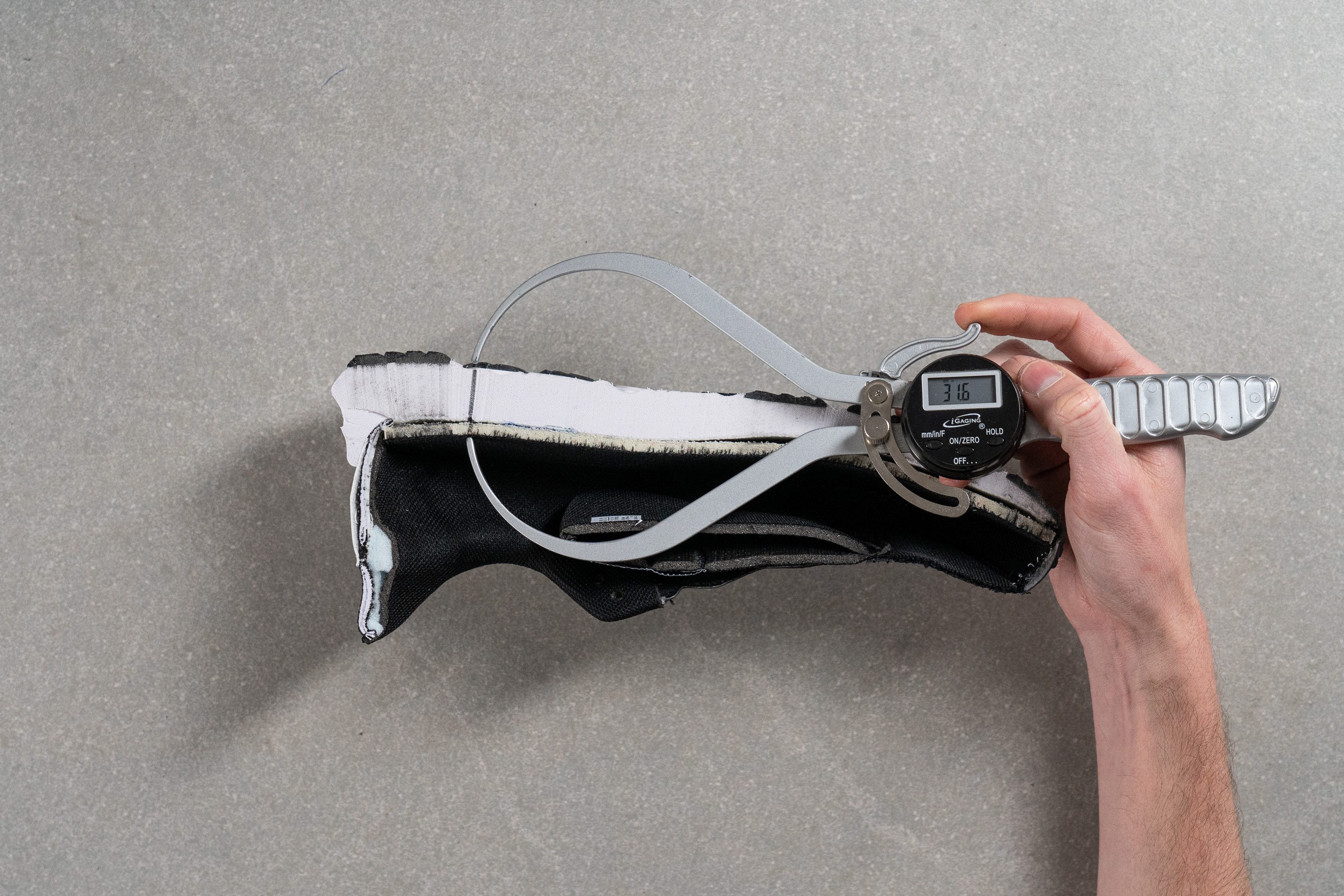
| Jolt 4 | 31.6 mm |
| Average | 34.8 mm |
Forefoot stack
The forefoot stack turned out to be even lower than the category average at 22.2 mm. We experienced a minimal buffer between the balls of our feet and the ground.
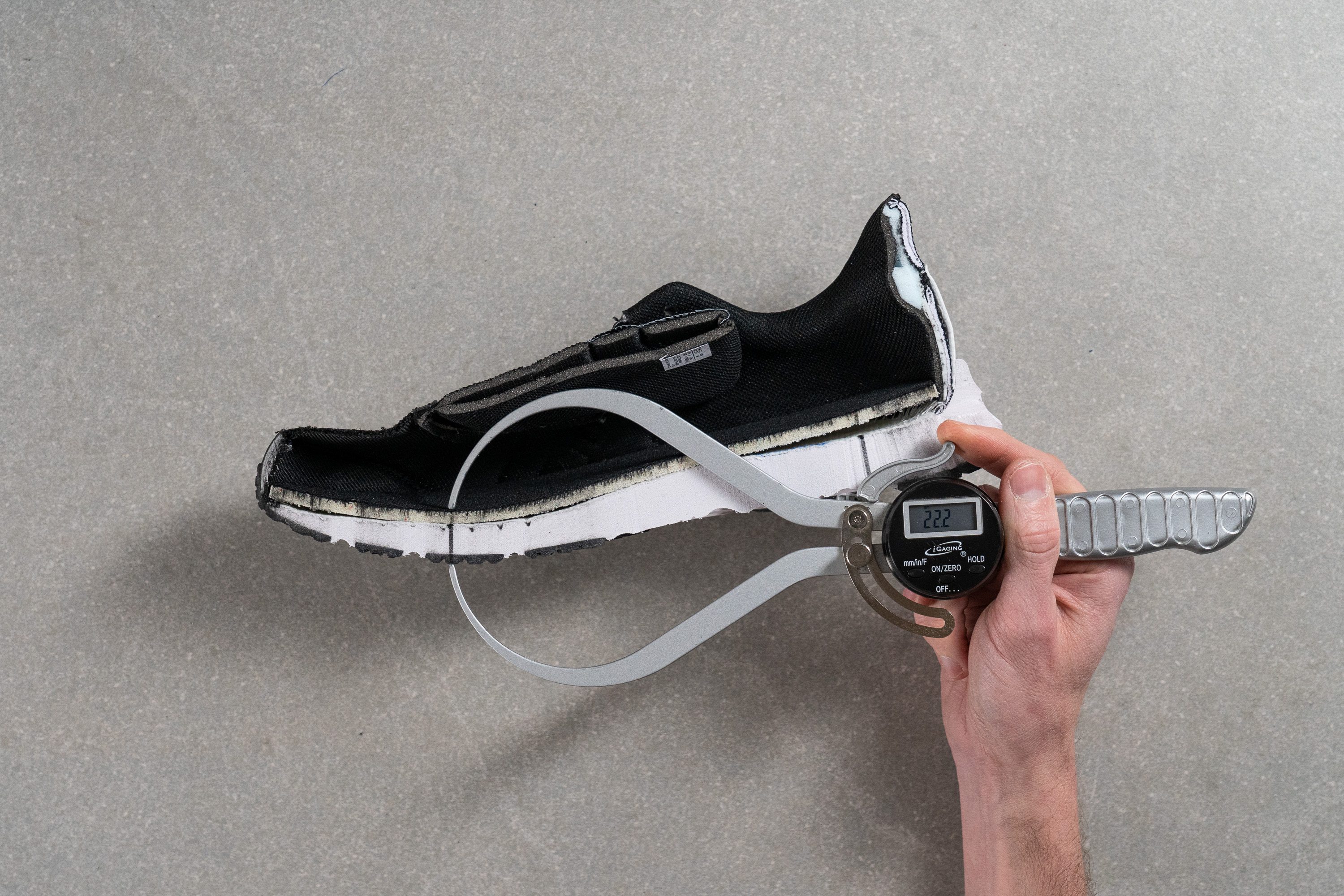
| Jolt 4 | 22.2 mm |
| Average | 26.2 mm |
Drop
The difference in our stack measurements leaves us with a slightly higher-than-advertised heel drop of 9.4 mm as opposed to the 8 mm stated by ASICS. This difference isn't too vast and places the Jolt 4 in the category of high-drop shoes.
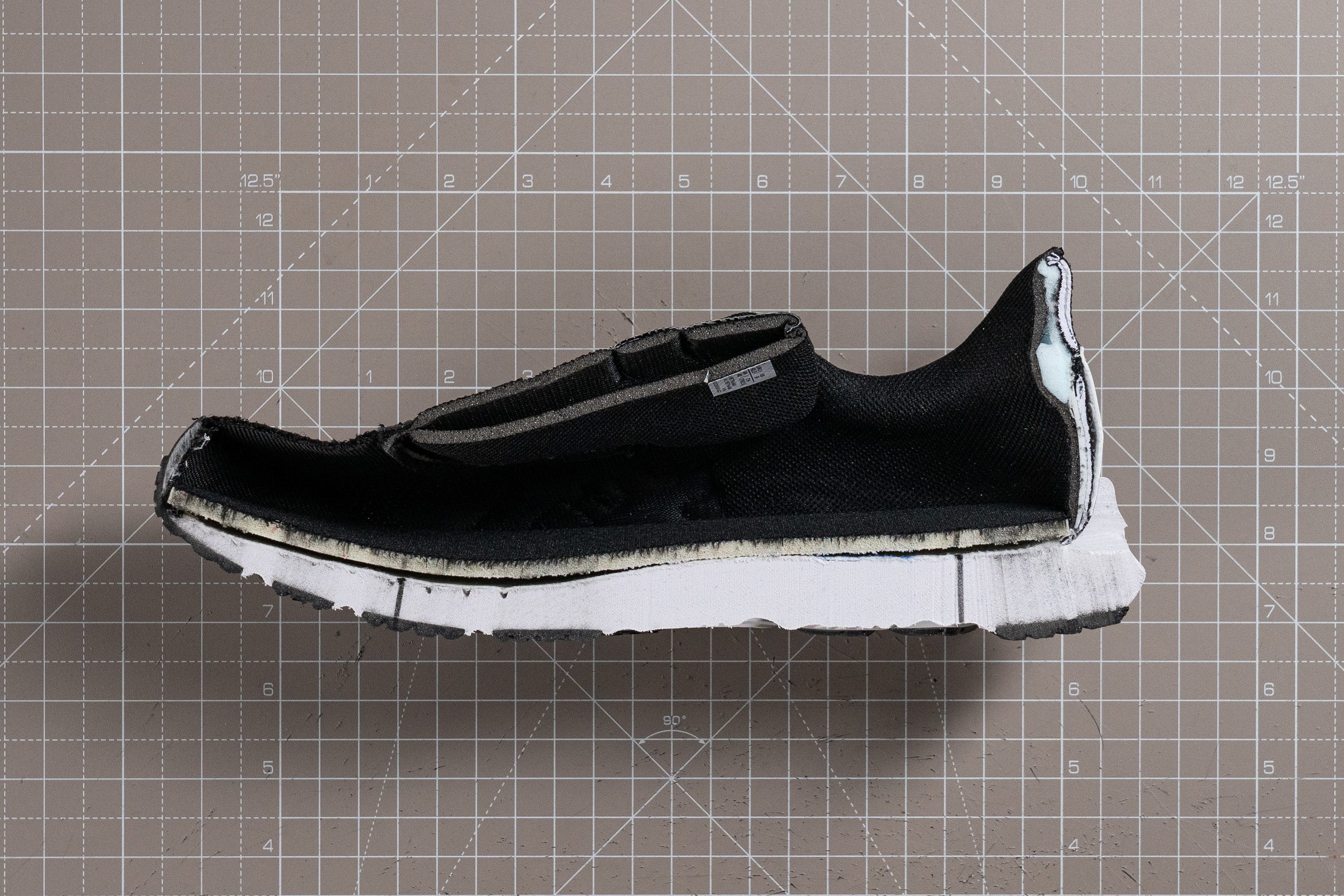
This is a good drop height for beginner runners with a heel-striking stride as the elevated heel provides extra protection upon impact with the round and promotes smoother heel-to-toe transitions. For a better understanding of the pros and cons of different heel drops, we recommend checking out this article that explores the matter.
| Jolt 4 | 9.4 mm |
| Average | 8.6 mm |
Midsole softness
Pressing our durometer against the midsole yields a reading of 29.8 HA which is significantly firmer than average. As such, while the shoe does provide decent impact protection during our landings, the cushioning feels a little brickish underfoot.
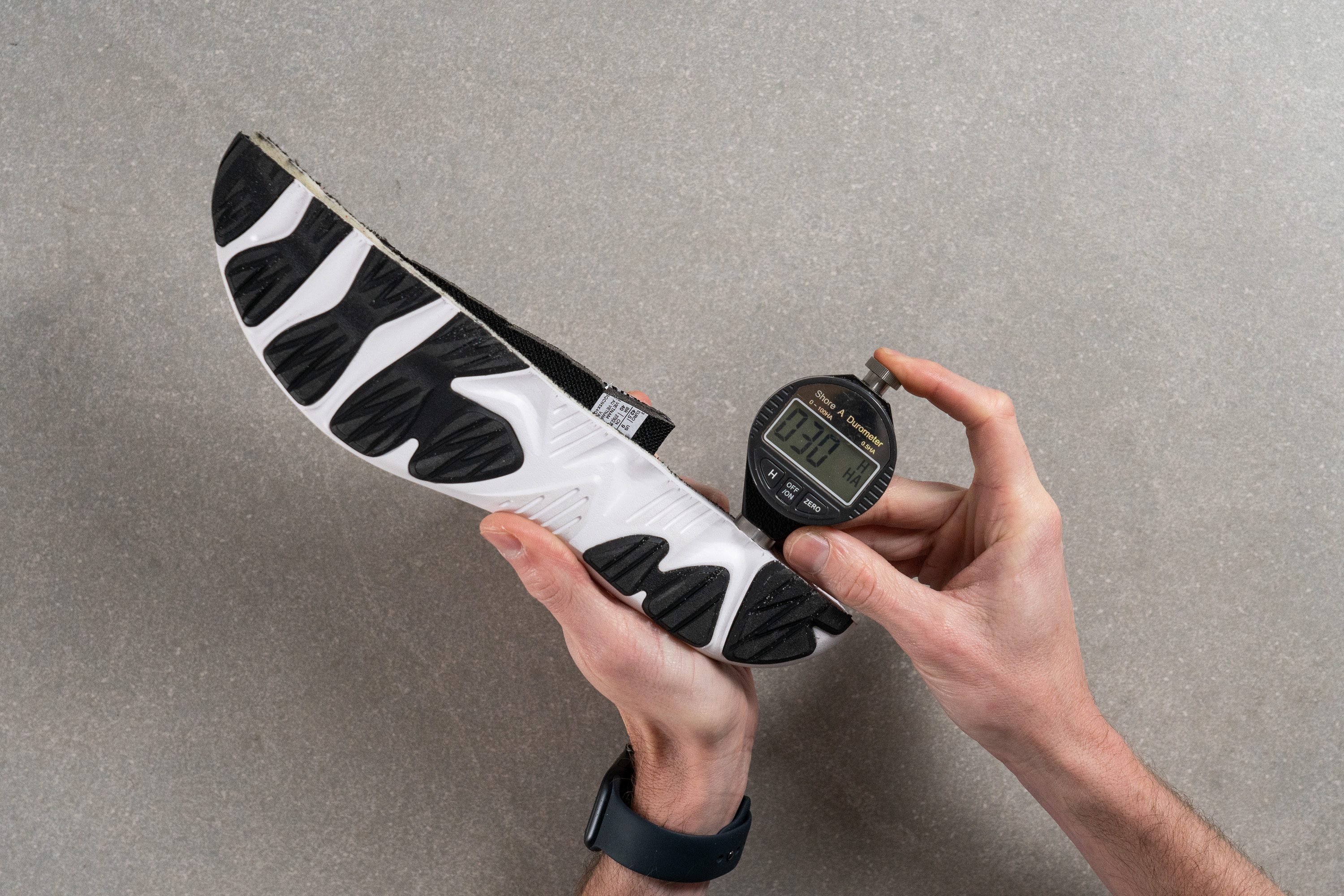
What's more, we found the midsole isn't responsive enough to give us the jolt needed to facilitate speedier or longer runs in this shoe.
While these factors may not sound that appealing at first, they do mean that the shoe feels quite stable underfoot, especially for more heavy-set runners.
For those in the market for more balanced cushioning from the daily trainers should look into the ASICS Gel Excite 10 as an alternative, while those looking for a more plush and responsive ride for speedy sessions should check out the more premium ASICS Novablast 4.
| Jolt 4 | 29.8 HA |
| Average | 20.4 HA |
Size and fit
Size
ASICS Jolt 4 fits true to size (27 votes).
Internal length
| Jolt 4 | 271.6 mm |
| Average | 269.4 mm |
Width / Fit
Using our caliper, we measured the Jolt 4's toebox to be 100.4 mm wide at its widest point. This is ever so slightly wider than average and means that the shoe should accommodate most foot shapes rather comfortably.
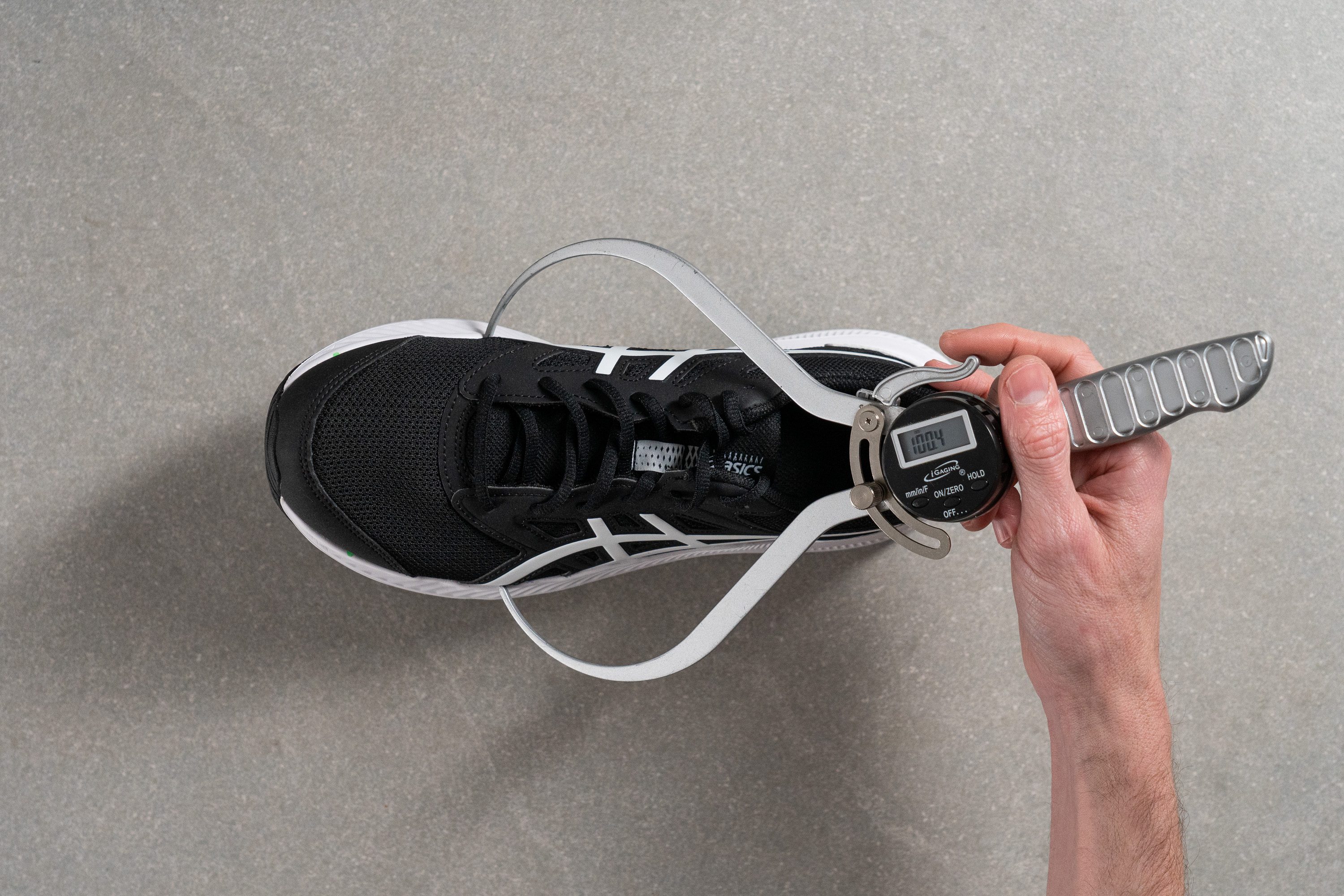
For broad-footed runners who prefer a little more real estate from their daily trainers, we recommend checking out the Adidas Supernova 3 instead.
This test follows an older methodology, which is why you don't see recently tested shoes in the chart. Results from different methodologies can not be compared.
| Jolt 4 | 100.4 mm |
| Average | 98.5 mm |
Toebox width
Moving up to the area around the big toe, the Jolt 4's toebox is 79.9 mm wide. this is also slightly roomier than average which gives us ample room to splay out naturally without worrying about hotspots or blisters.
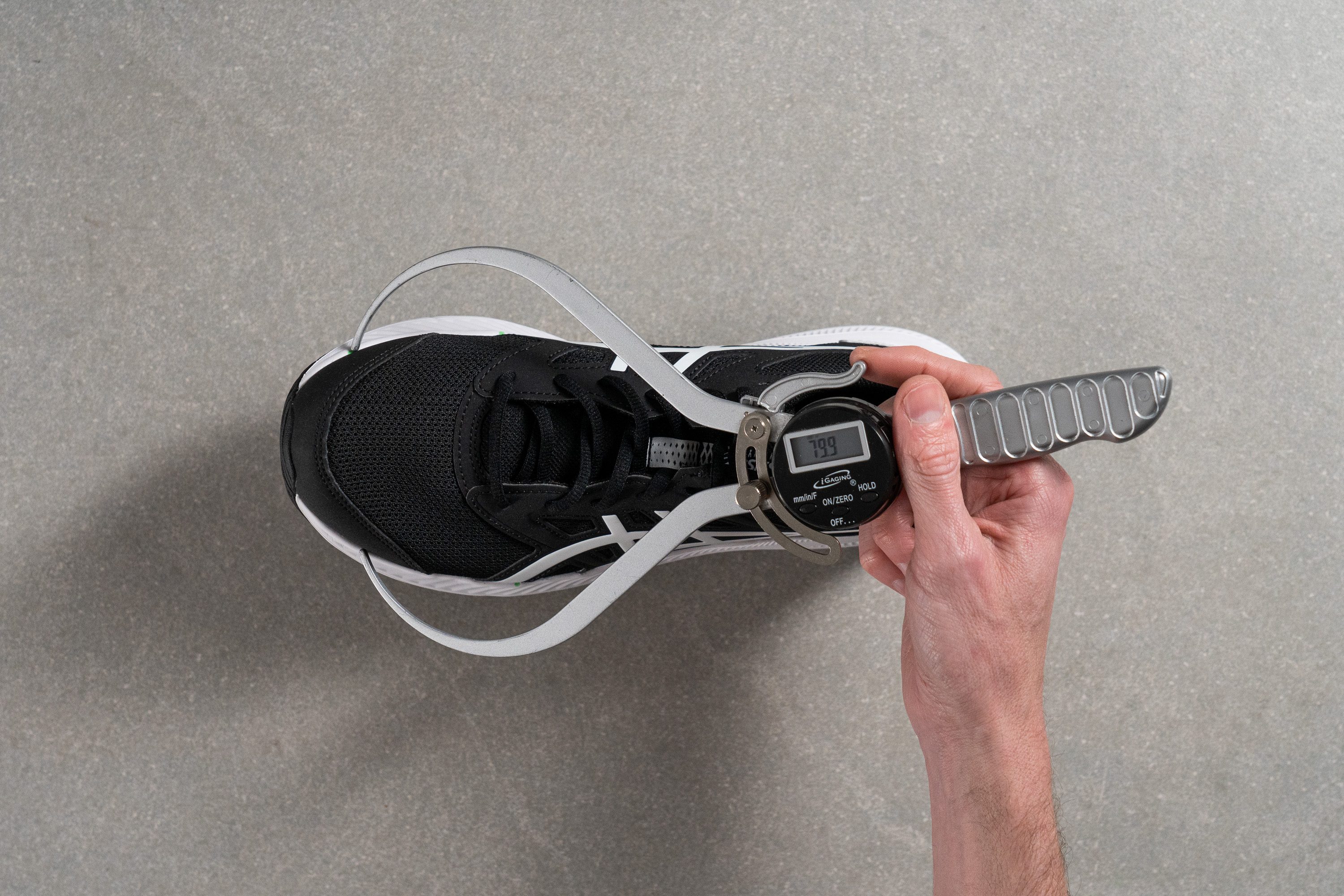
This test follows an older methodology, which is why you don't see recently tested shoes in the chart. Results from different methodologies can not be compared.
| Jolt 4 | 79.9 mm |
| Average | 78.4 mm |
Traction / Grip
Traction test
Whether out on the road, on the treadmill, or even on well-manicured park trails, we experienced good traction while testing the Jolt 4. The only hesitation came when crossing patches of wet and slick cobblestones.
That was confirmed in our lab test, where the Jolt 4 scored 0.33, matching our expectations.
| Jolt 4 | 0.33 |
| Average | 0.49 |
Outsole design
The ASICS Jolt 4 features partial rubber coverage with a segmented layout. Black rubber pods are placed at high-impact zones while the rest of the outsole consists of exposed foam in white, contributing to a lightweight construction.
The design also integrates multiple horizontal flex grooves across the forefoot and heel to support foot movement.
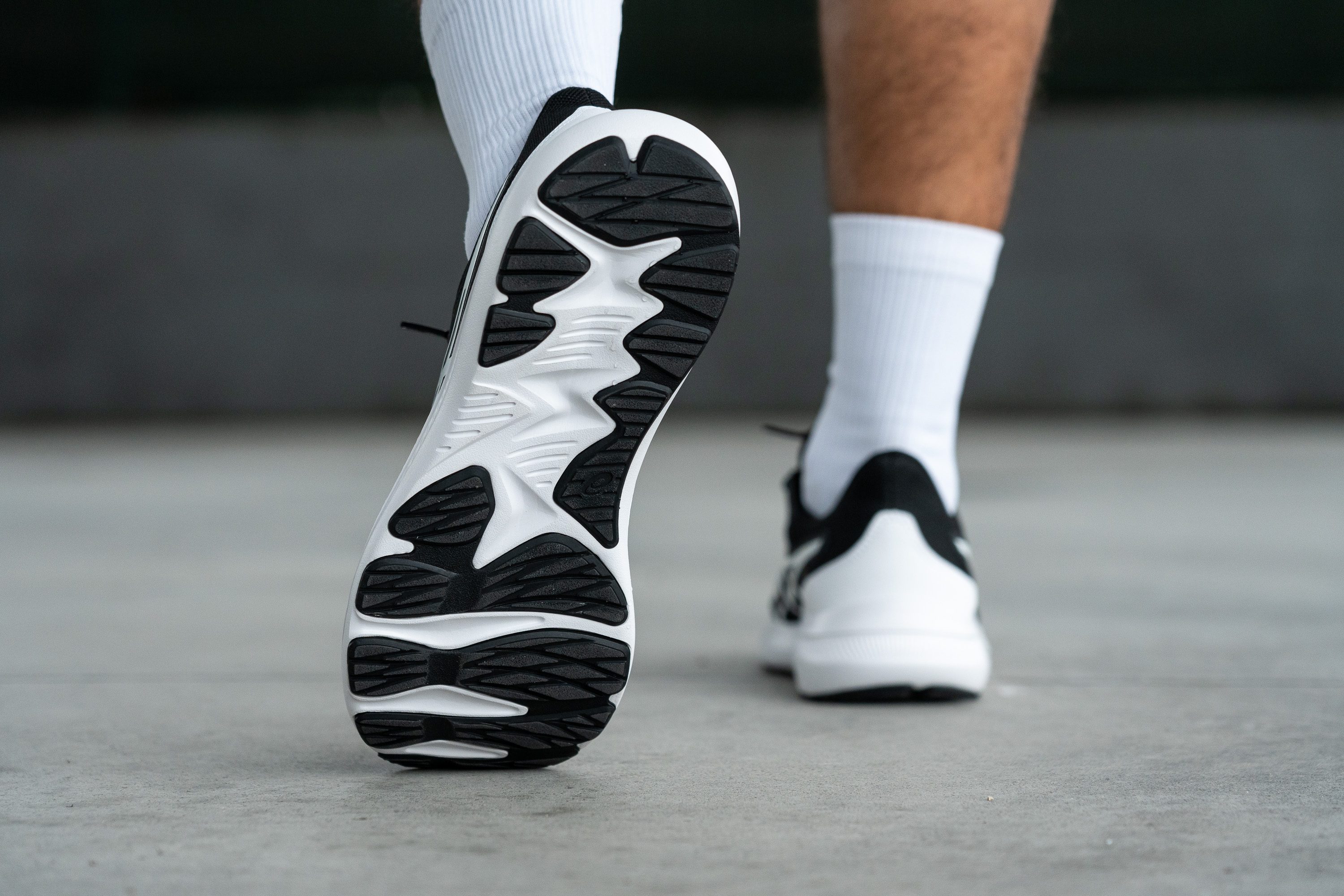
Flexibility / Stiffness
We secured the Jolt 4 to our machine and measured the amount of force needed to bend the shoe 30 degrees. With a reading of 11.2N, the Jolt 4 is more flexible than the average running shoe which allows it to bend along with the natural flexion of our foot with relative ease.
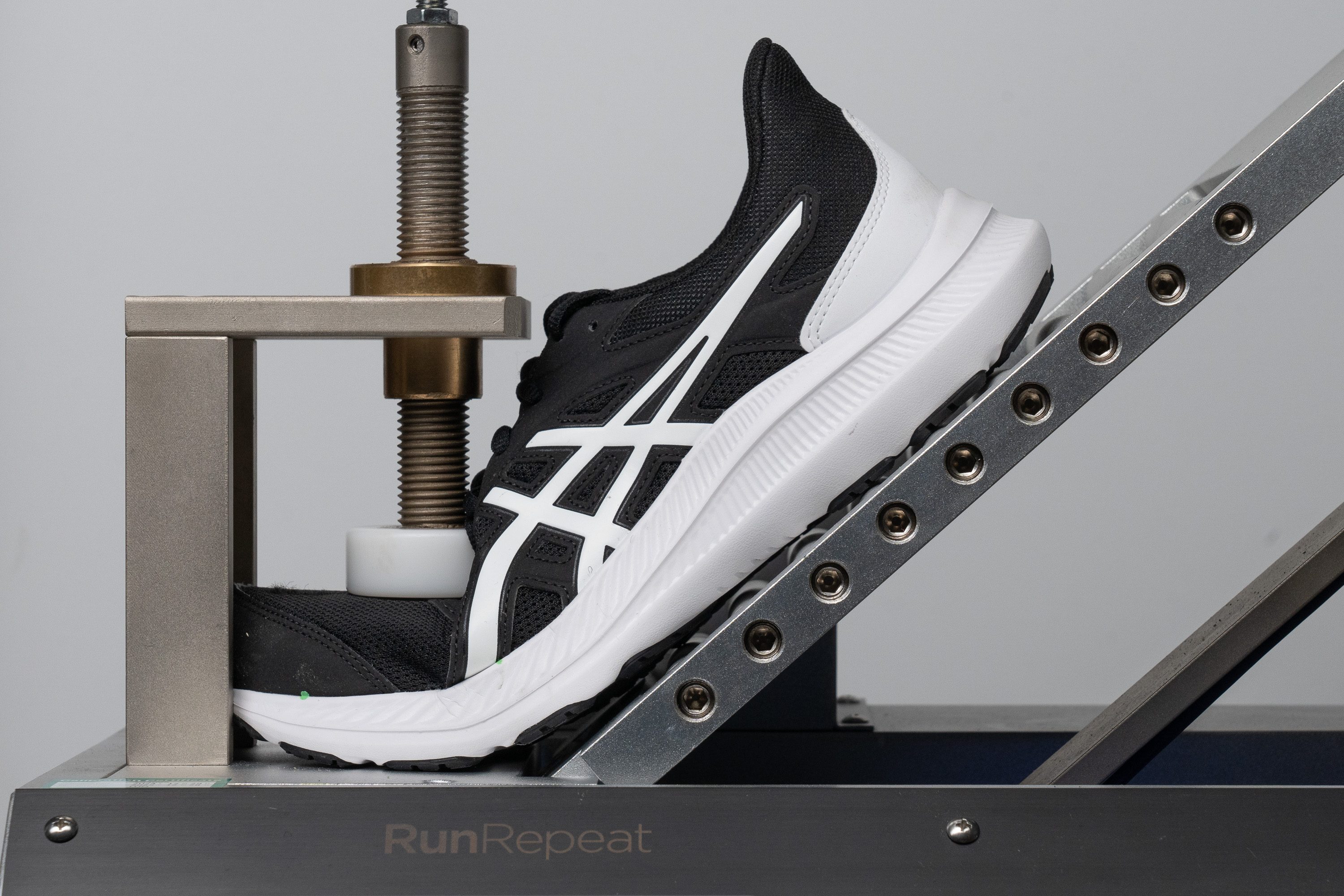
| Jolt 4 | 11.2N |
| Average | 15.3N |
Stiffness in cold (%)
We also repeated the flex test after chilling the Jolt 4 in our freezer for twenty minutes and found that it only became 24.5% stiffer, making it significantly more consistent than the average running shoe. What's more, with only 27.5N of force needed to bend the cold Jolt 4 to the desired point, it's not only more flexible than average under similar conditions, but at room temperature too! As such, this shoe can serve as a good year-round training partner, given it's used in tandem with a pair of warm socks during the cooler months.
| Jolt 4 | 25% |
| Average | 33% |
Weight
Weighing in at 9.1 oz (259g), the Jolt 4 is on par with the average road running shoe.
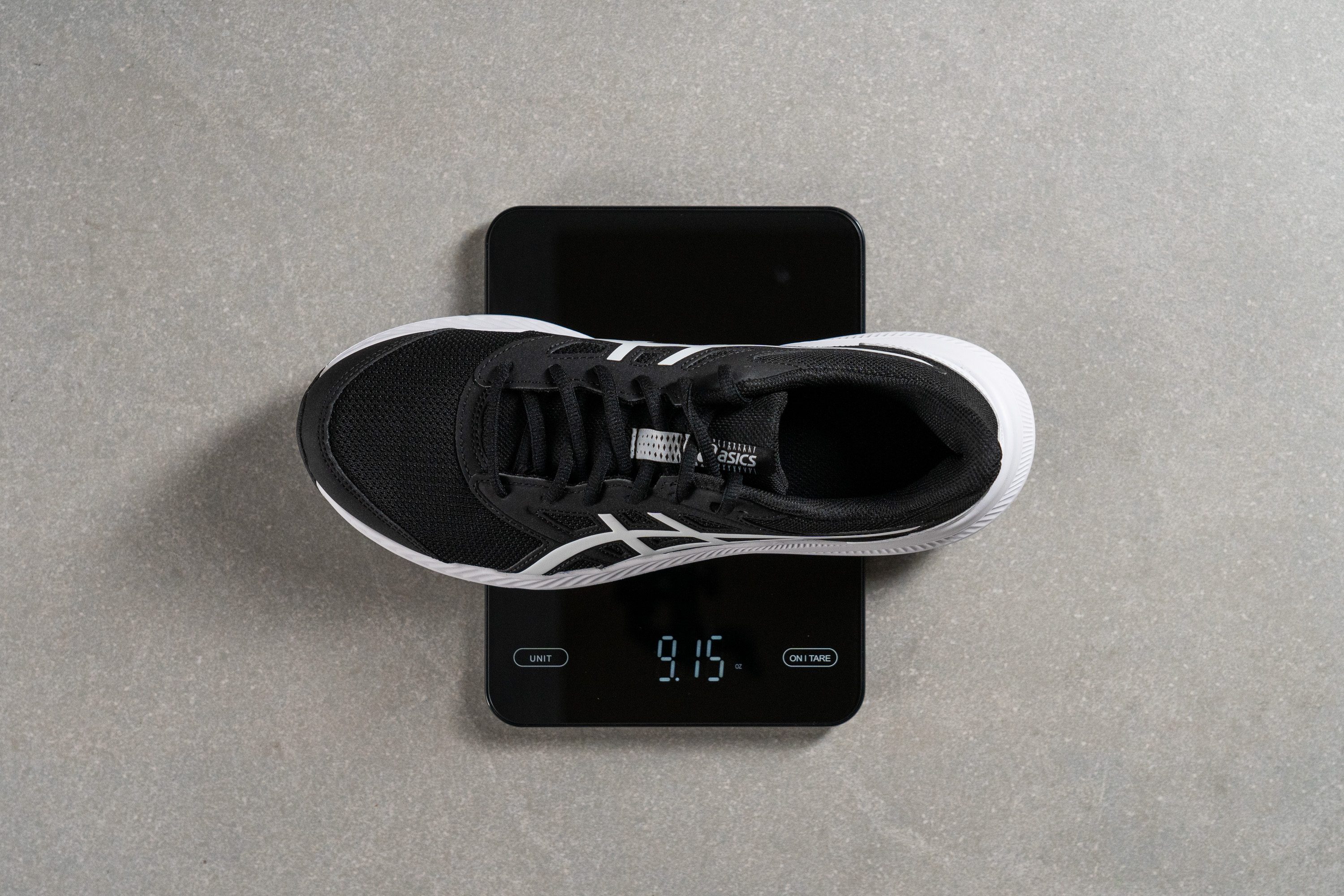
| Jolt 4 | 9.1 oz (259g) |
| Average | 9.3 oz (264g) |
Breathability
We pumped the Jolt 4 full of smoke to get a visual idea of how well-ventilated it is. As we can clearly see from the footage, the smoke filters out of the shoe quickly and evenly throughout the upper. This leads us to give the Jolt 4 a perfect 5 out of 5 for breathability, making it a great summertime training partner.
Looking at a backlit cross-section of the upper, the light easily shines through the many pores in the upper mesh, thus explaining the excellent airflow.
Looking at the mesh under our microscope, we get an image of organized chaos. The fibers are braided seemingly haphazardly but in a way that creates a clear and uniform pattern with lots of perforations and gaps that promote excellent airflow.
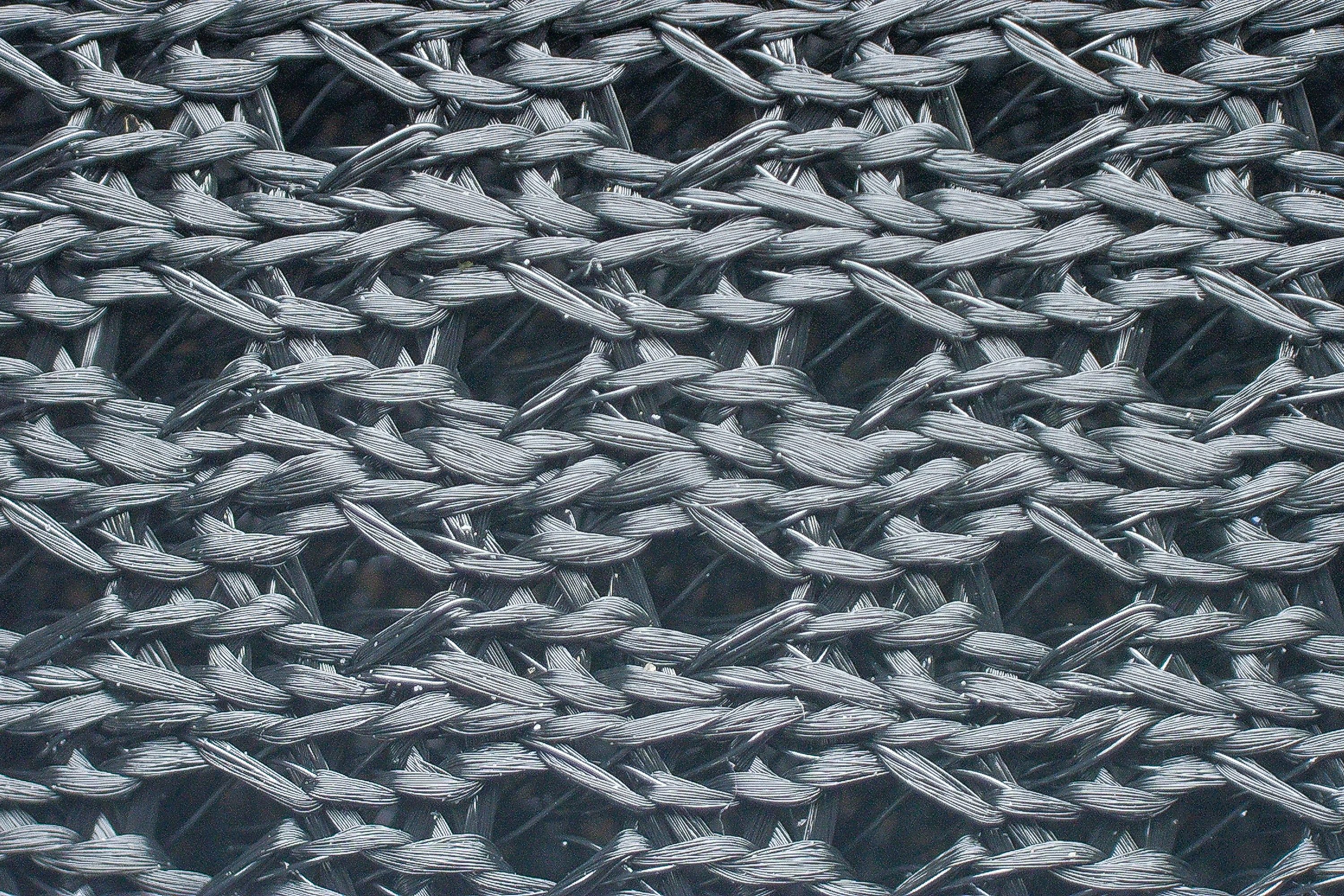
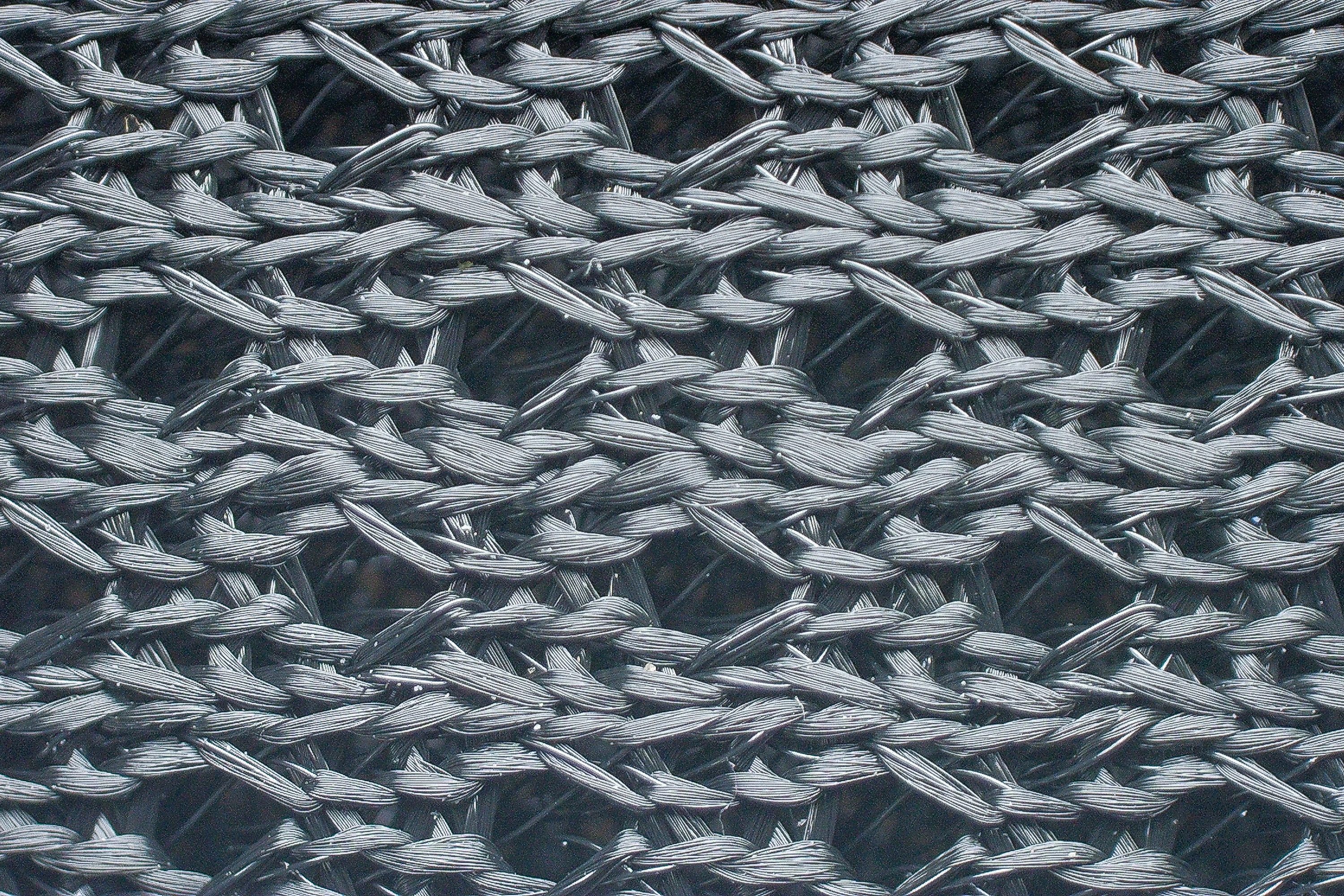
| Jolt 4 | 5 |
| Average | 3.7 |
Stability
Lateral stability test
Despite being marketed as a neutral daily trainer, the Jolt 4 feels incredibly well-planted as we shift our weight from side to side in the shoe. This means that those with mild overpronation in their strides can make good use of this shoe, however, we recommend that those with more pronounced overpronation look into a more supportive shoe like the ASICS GT 1000 12.
Torsional rigidity
With its healthy stack of dense foam, it's no wonder we found it so difficult to bend and twist the shoe in our hands, leading us to give the Jolt 4 a torsional rigidity score of 4 out of 5.
This means that the shoe resists the natural twisting and contortions of our foot during our stride and maintains a relatively level base that promotes surefooted landings and toe-offs.
| Jolt 4 | 4 |
| Average | 3.5 |
Heel counter stiffness
The Jolt 4's well-structured and reinforced heel counter barely budged as squeezed and poked at it, earning it a stiffness score of 5 out of 5. As such, the shoe mitigates any excessive lateral movements of our heel which helps to promote a more neutral gait. However, as previously stated, those with severe overpronation should look into a dedicated stability shoe in order to avoid injury.
| Jolt 4 | 5 |
| Average | 2.9 |
Midsole width - forefoot
Another big contributor to the Jolt 4's stable ride is its broad base, with the midsole measuring 116.6 mm wide at the forefoot.
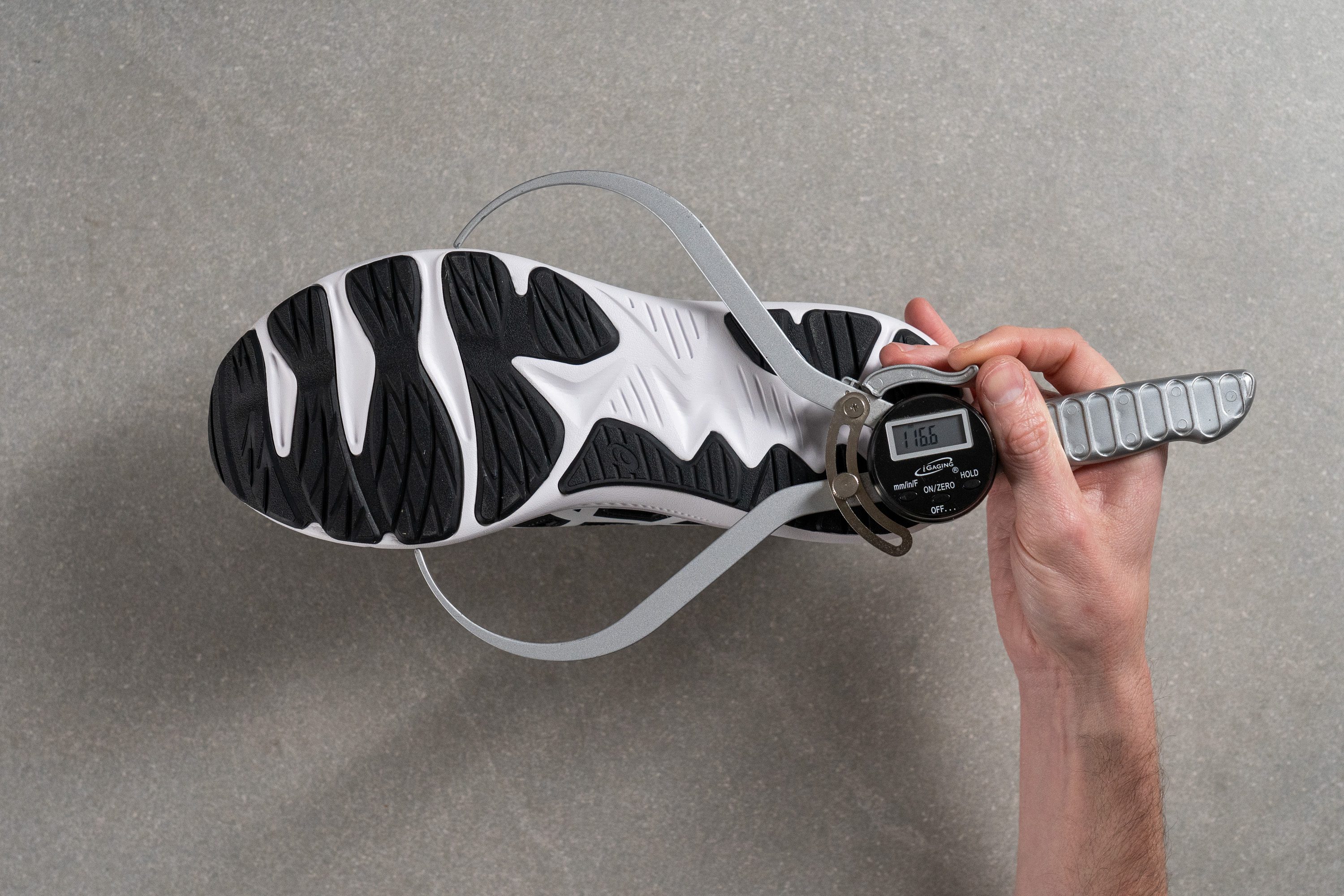
This gives us more than enough of a platform underfoot to ensure stable landings and toe-offs while still being nimble enough to take corners without feeling too blocky.
| Jolt 4 | 116.6 mm |
| Average | 114.4 mm |
Midsole width - heel
The midsole is also a little wider than average at the heel which is 92.8 mm wide according to our caliper measurements.
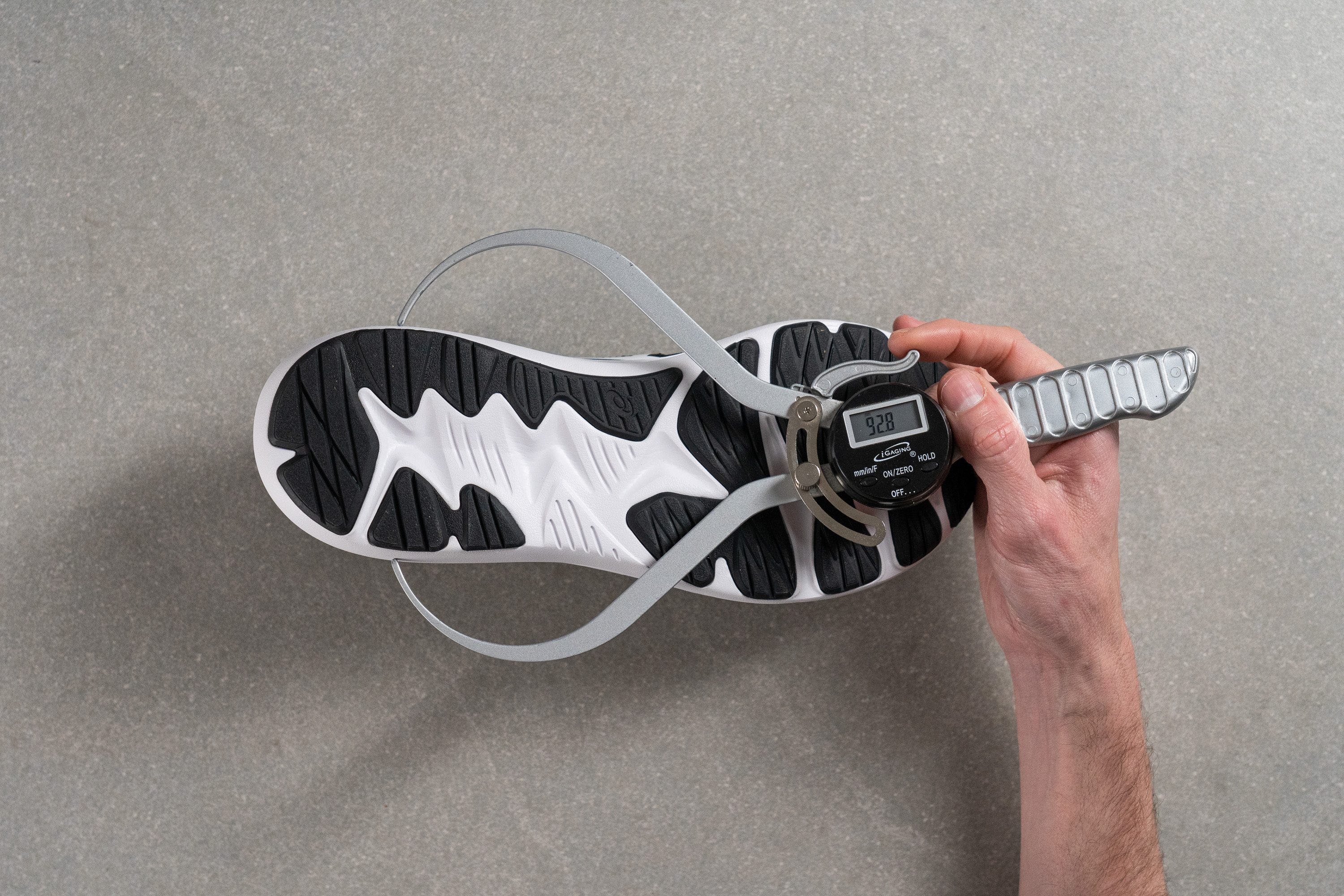
This means that heel strikers will also enjoy a stable landing platform in the Jolt 4.
| Jolt 4 | 92.8 mm |
| Average | 90.6 mm |
Durability
Toebox durability
We fired up our Dremel to 5K RPM and set it against the toebox with 3.2 N of force to simulate extreme wear and tear. The tool immediately shreds into the upper mesh and minces through it until the abrasive element gets stuck by the end of the four-second test.
The massive hole left in the toebox leads us to give the Jolt 4 a 1 out of 5 for toebox durability which isn't unusual for a road shoe, especially at this price point.
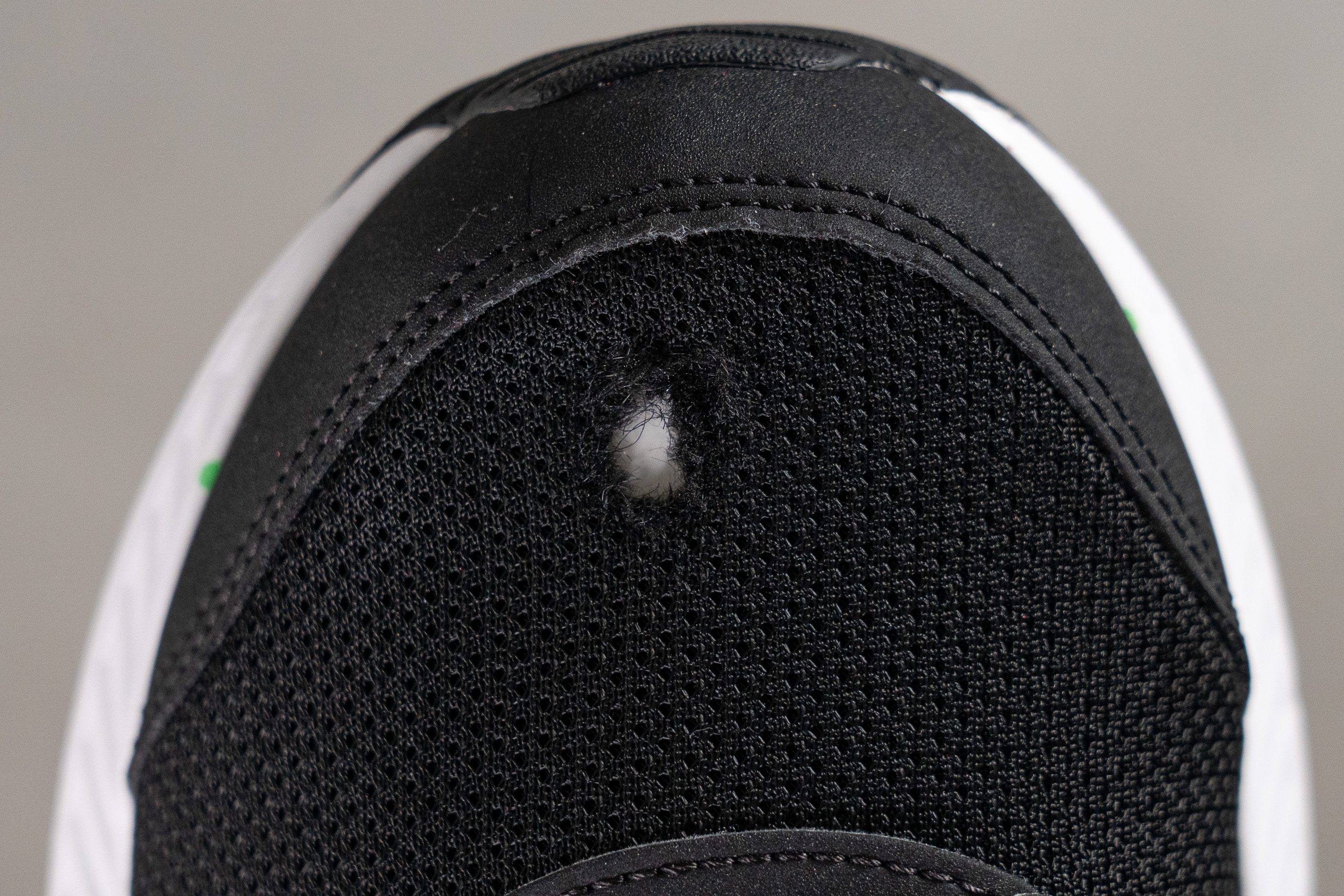
| Jolt 4 | 1 |
| Average | 2.6 |
Heel padding durability
The heel counter proved to be an even more worthy contender against our Dremel. The tool took some before it was able to bite into the lining material which did a good job of protecting the soft padding within.
Once the four-second test was up, we found that we had mangled the lining at the heel but did very little to affect the integrity of the padding at the heel, leading us to give the Jolt 4 a heel padding durability score of 3 out of 5.
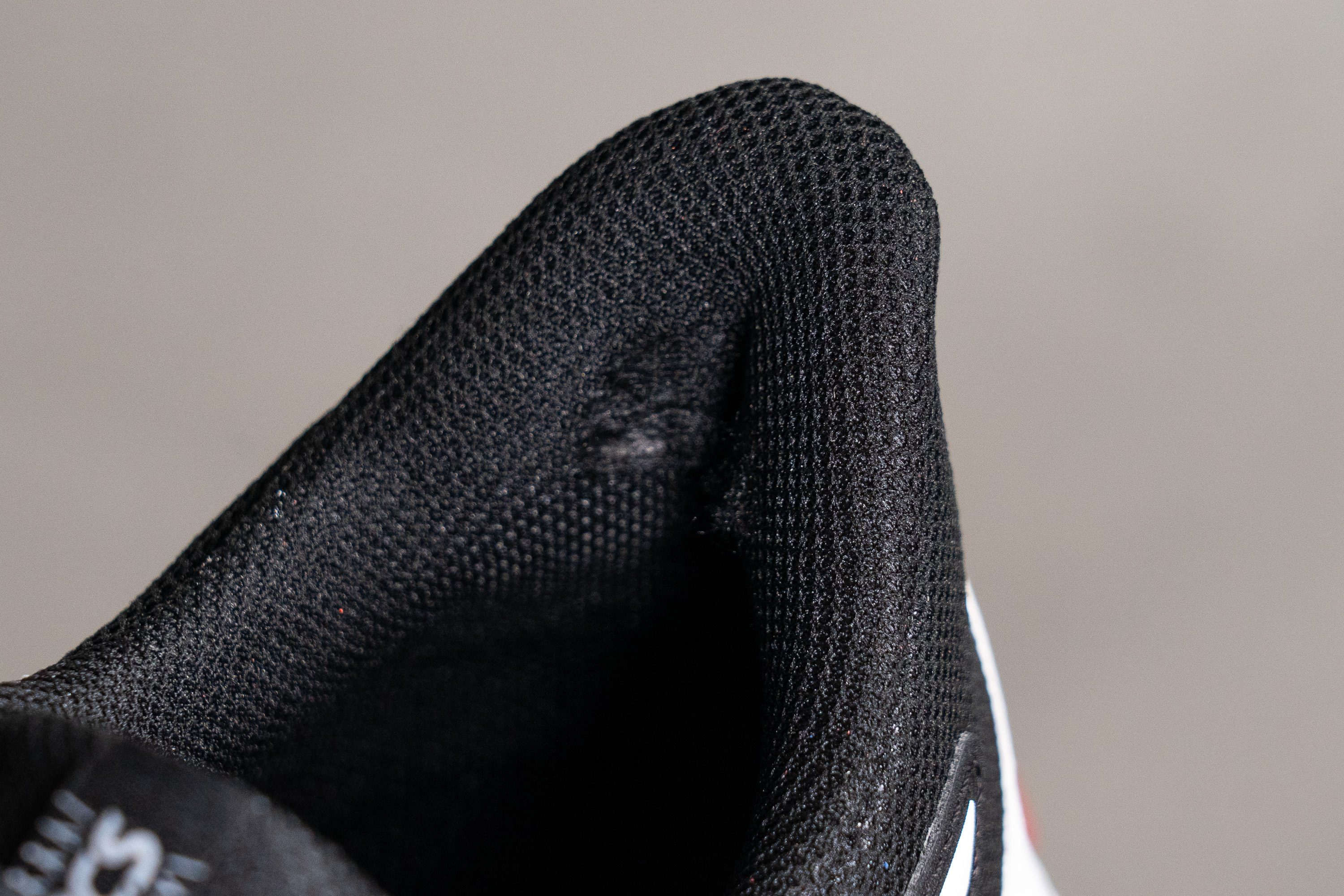
| Jolt 4 | 3 |
| Average | 3.4 |
Outsole hardness
With a durometer reading of 85 HC, the Jolt 4's outsole is slightly harder than our current lab average. This doesn't really affect the shoe's grip, but does bode well regarding the outsole's durability which we will be testing next.
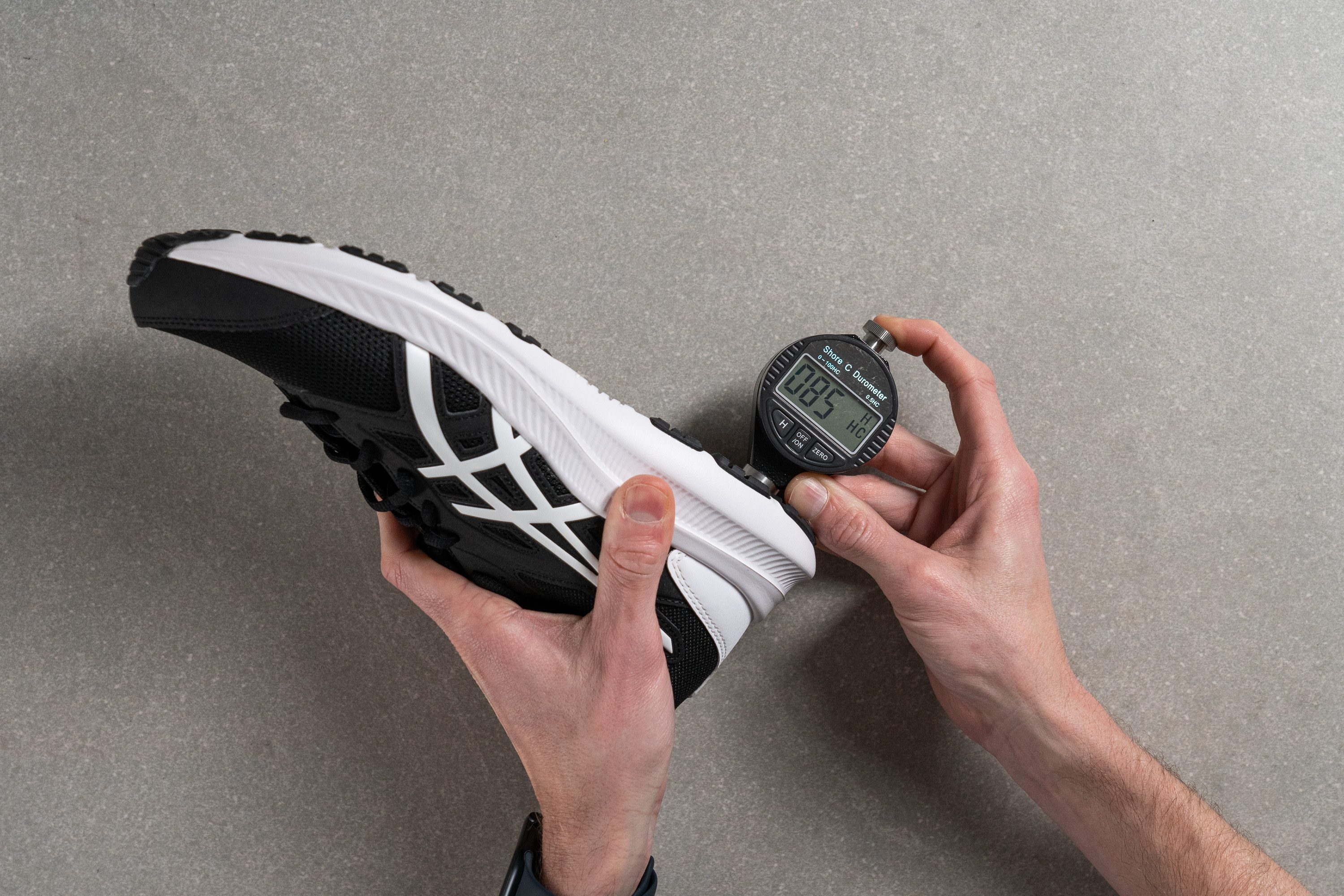
| Jolt 4 | 85.0 HC |
| Average | 79.2 HC |
Outsole durability
This time spinning at 10K RPM, we set the Dremel against the outsole, this time for twenty-two seconds of grinding.
As we can see, the test had little to no effect on the shoe, with our tire tread gauge finding that only 0.3 mm of material was lopped off. This makes the Jolt 4's outsole much more durable than the average road shoe's. As such, we expect this shoe to last well beyond 400 miles of normal use before noticing any significant signs of wear and tear to the outsole.
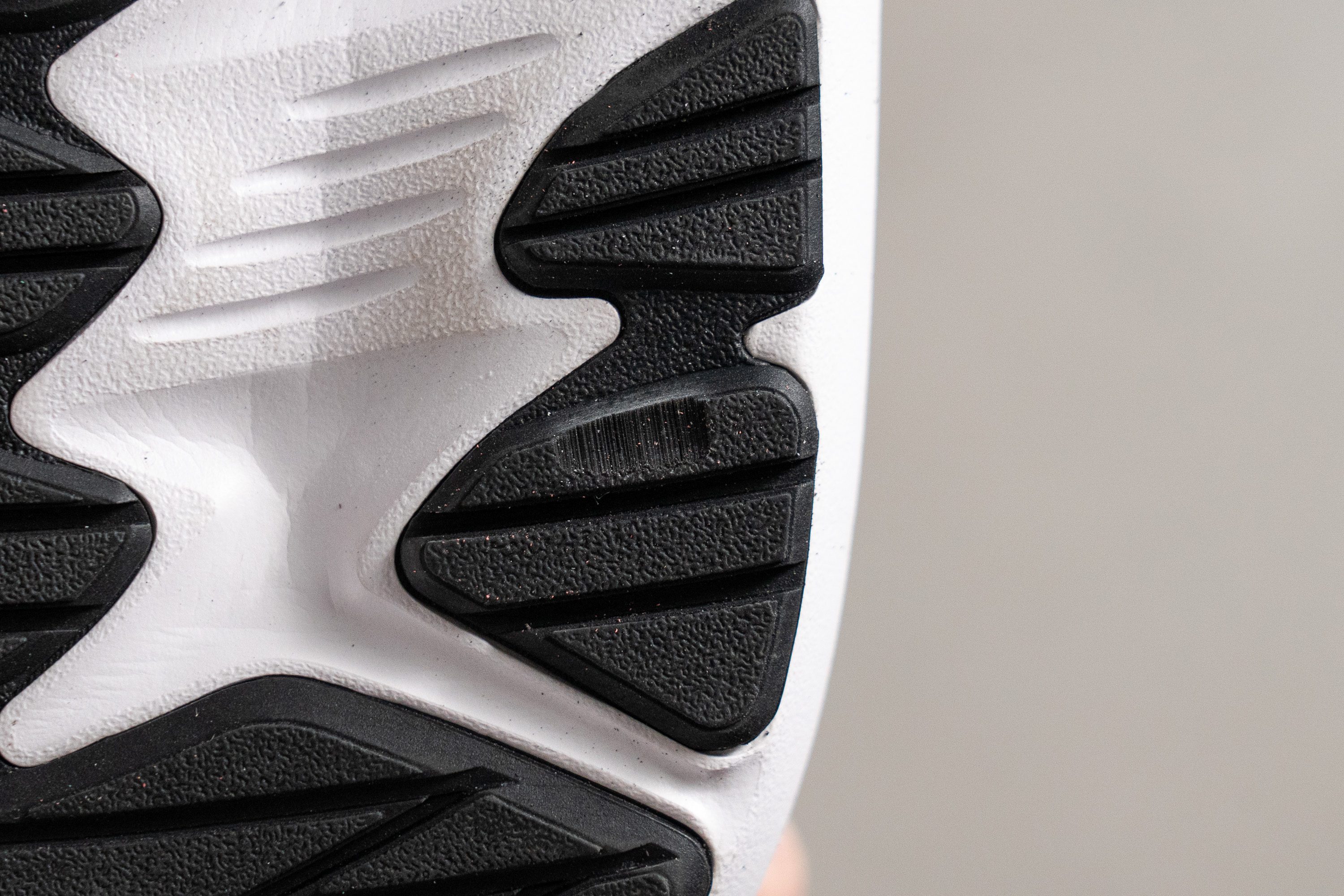
| Jolt 4 | 0.3 mm |
| Average | 1.1 mm |
Outsole thickness
Using our caliper, we measured the Jolt 4's outsole to be 4.1 mm thick. This is plenty of rubber underfoot and, considering how well it performed in our durability test, the shoe could have easily skimped on some material in order to shave off some more weight from the shoe.
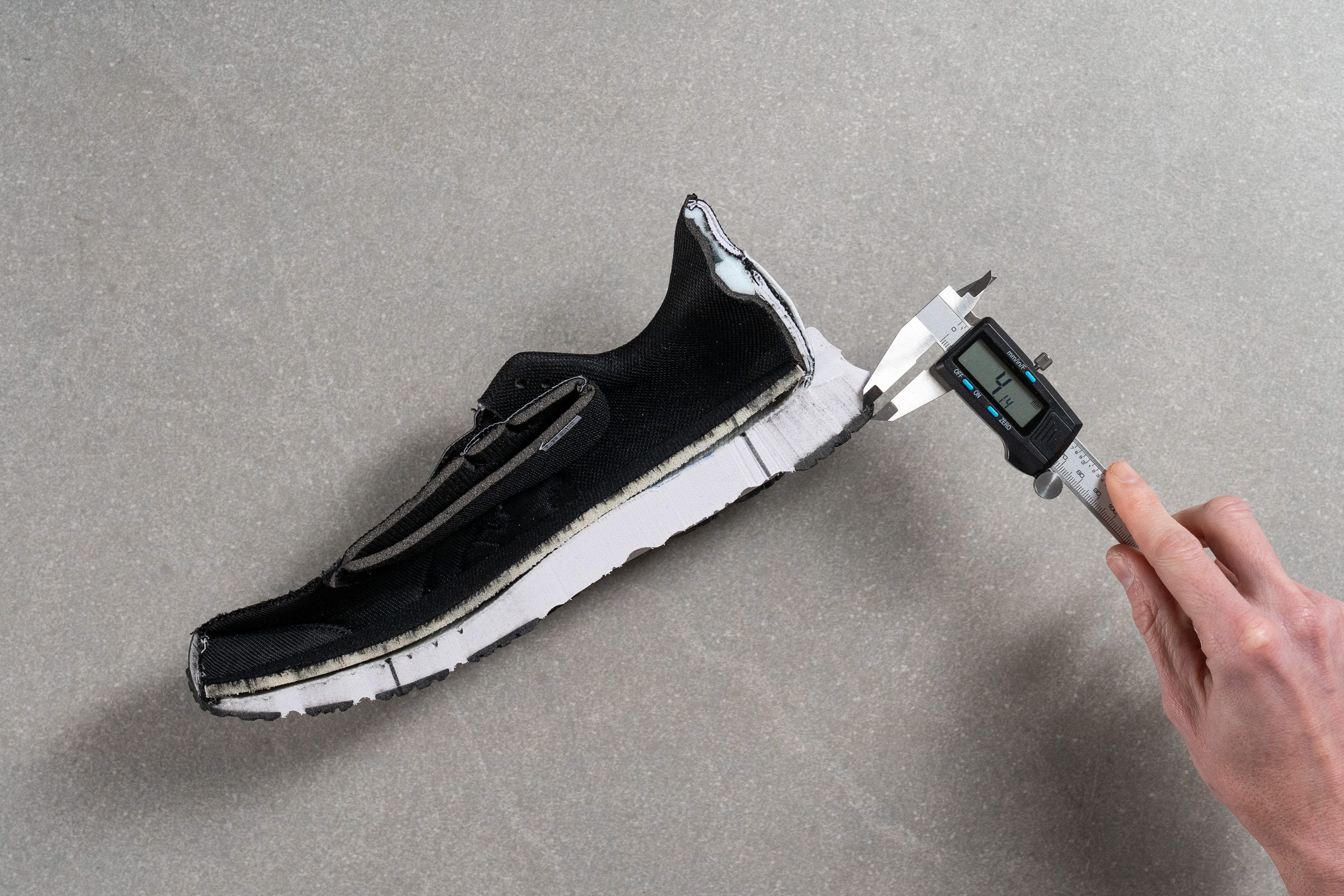
| Jolt 4 | 4.1 mm |
| Average | 3.2 mm |
Misc
Insole thickness
The Jolt 4's insole is slightly thicker than average at 5.3 mm thick according to our caliper measurements. This gives us an amply padded footbed that does a good job of complementing the midsole cushioning and provides a fair amount of arch support for our test runs.
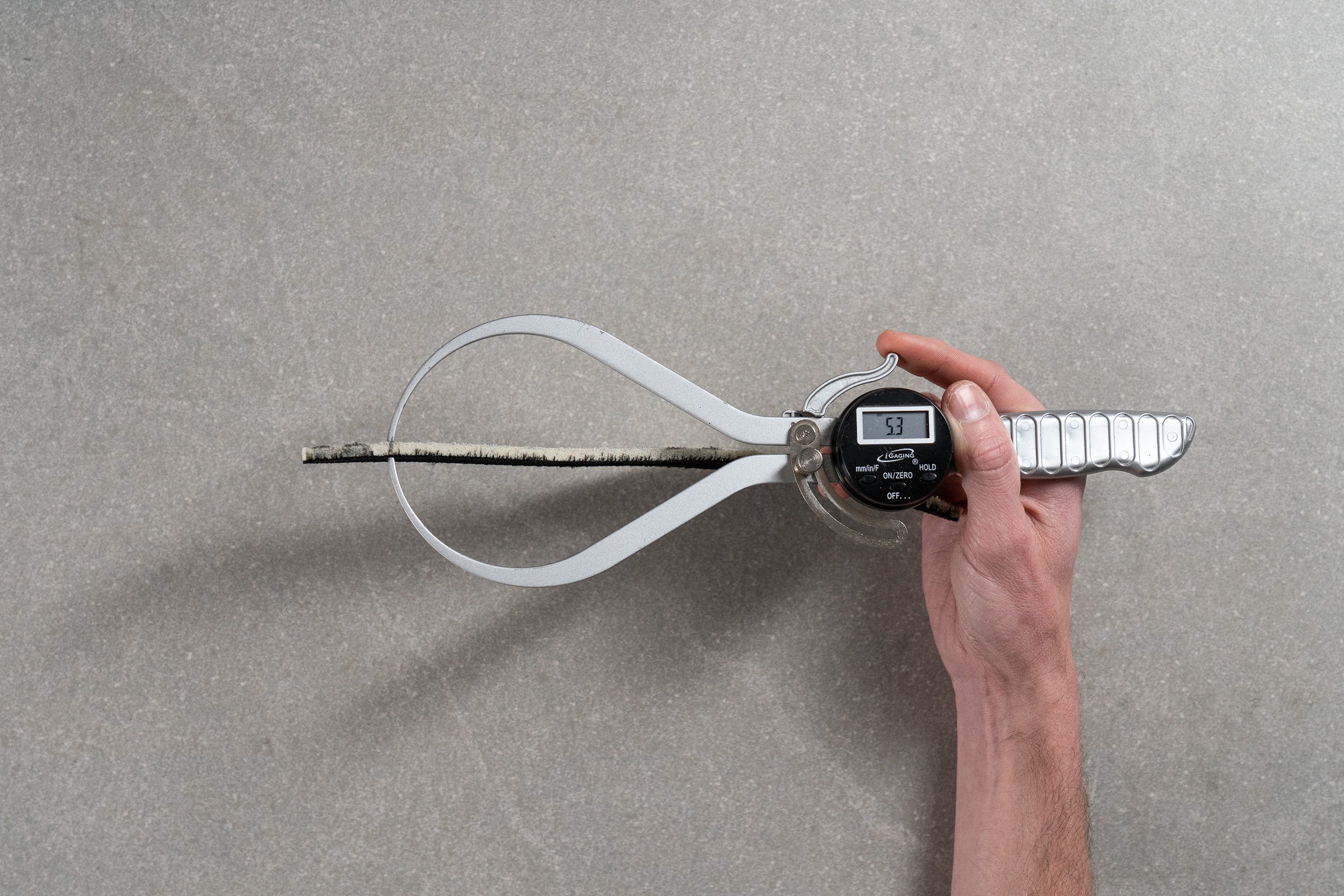
| Jolt 4 | 5.3 mm |
| Average | 4.5 mm |
Removable insole
The Jolt 4's insole is fully removable, so those in need of custom orthotics for added arch support can use them with this shoe.
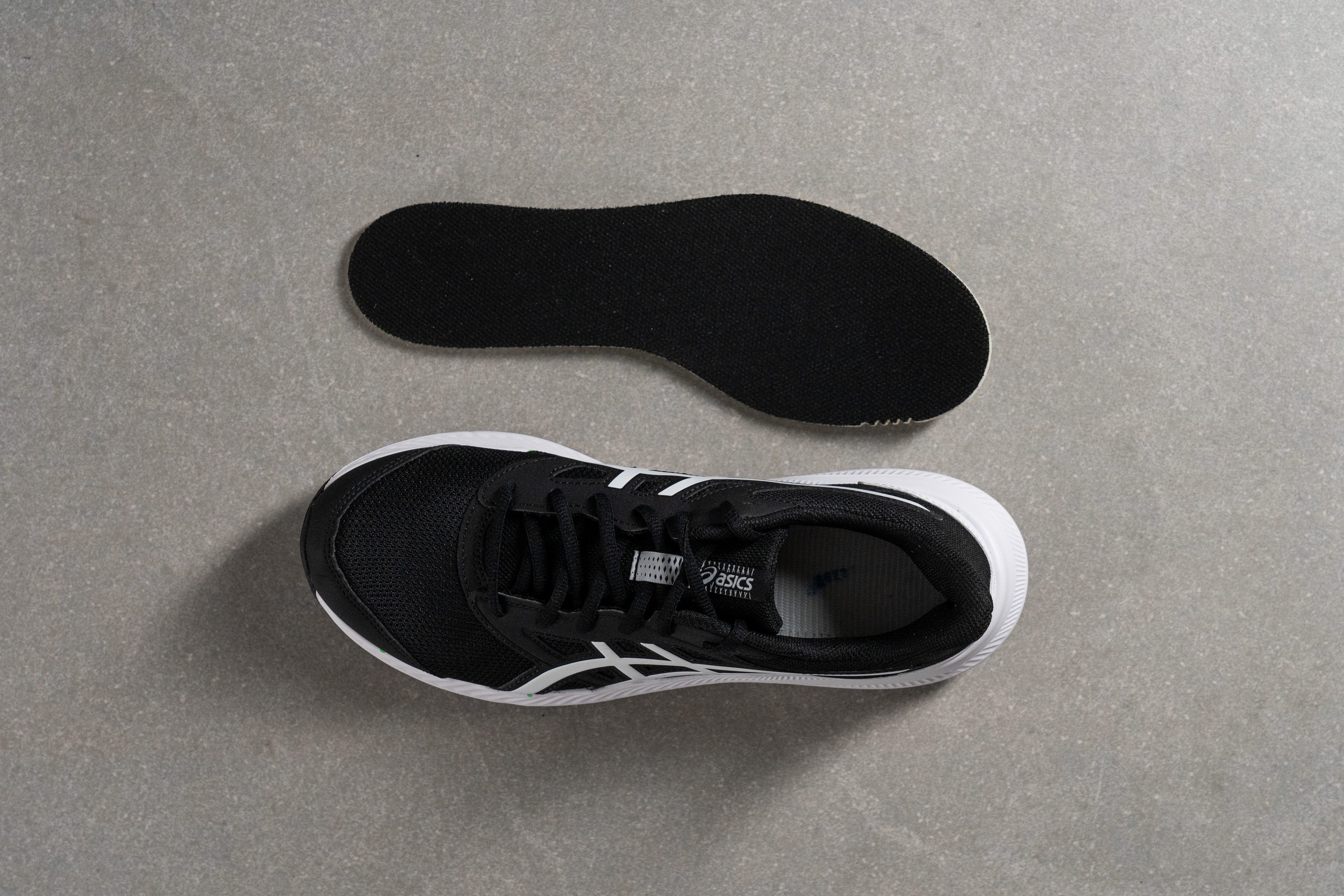
| Jolt 4 | Yes |
Midsole softness in cold (%)
To test the effects of cold conditions on the midsole, we placed the Jolt 4 in the freezer to chill for twenty minutes. We then pressed our durometer against the midsole once more and found that it only became 7.6% firmer with a reading of 32 HA. This is still a rather firm result, but shouldn't feel too different from how the shoe performs at room temperature.
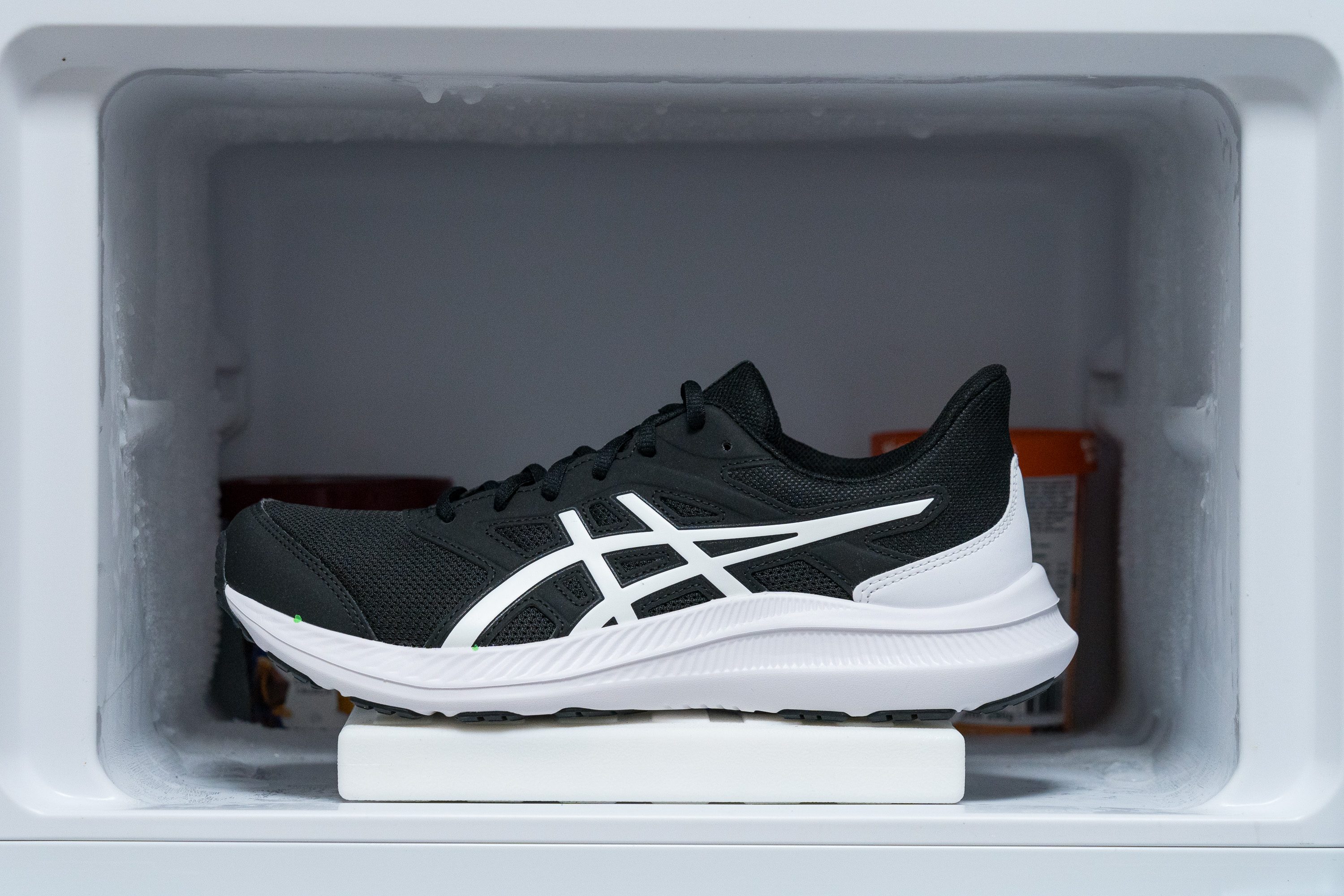
| Jolt 4 | 8% |
| Average | 24% |
Reflective elements
The Jolt 4 doesn't boast any reflective elements to speak of so we don't recommend going for nocturnal runs without using additional high-vis gear.
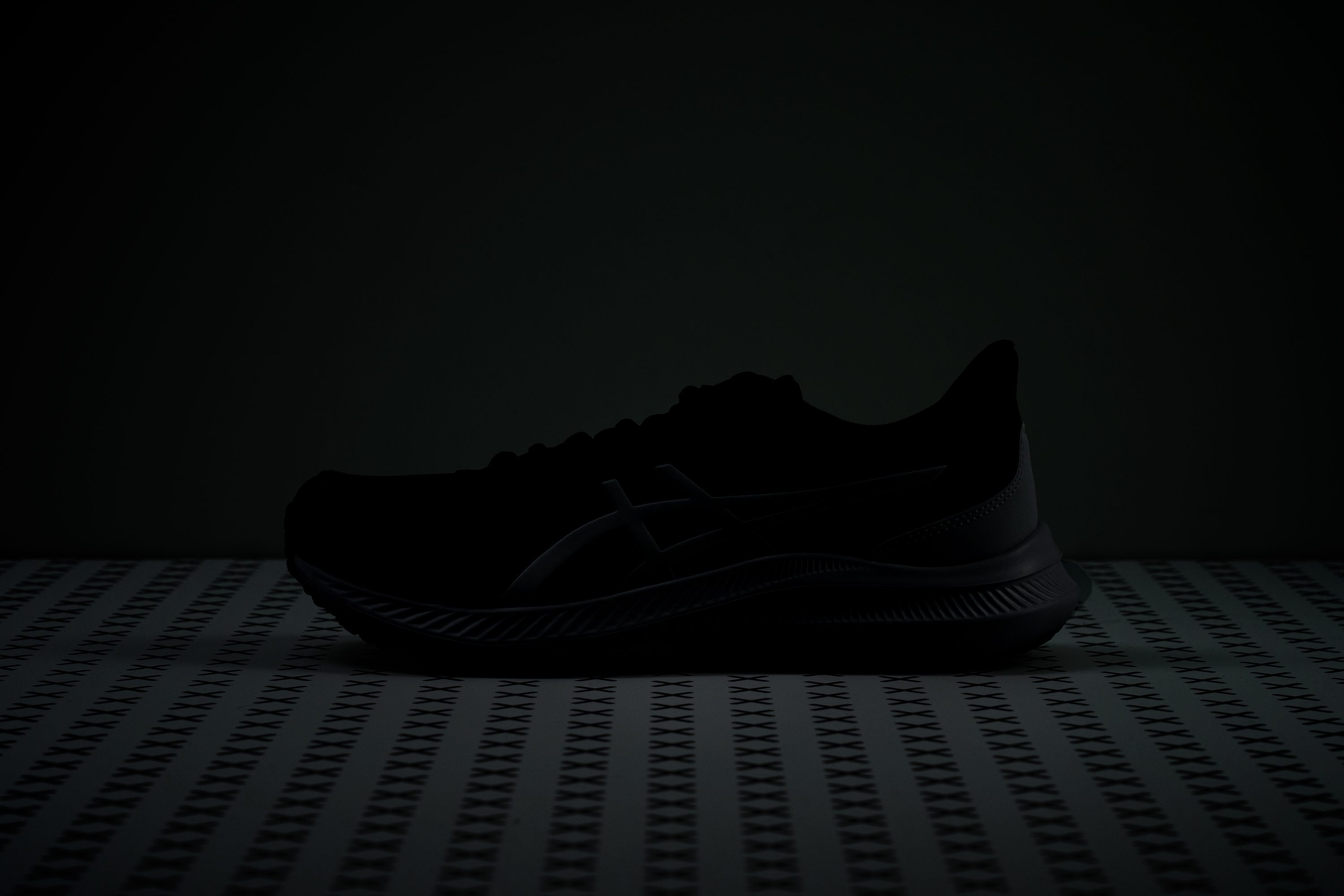
| Jolt 4 | No |
Tongue padding
At 8.8 mm thick according to our caliper measurements, the Jolt 4's tongue is thicker than our current lab average. This generous amount of padding provided us with excellent comfort across the instep while also effectively protecting us from lace bite while testing the shoe.
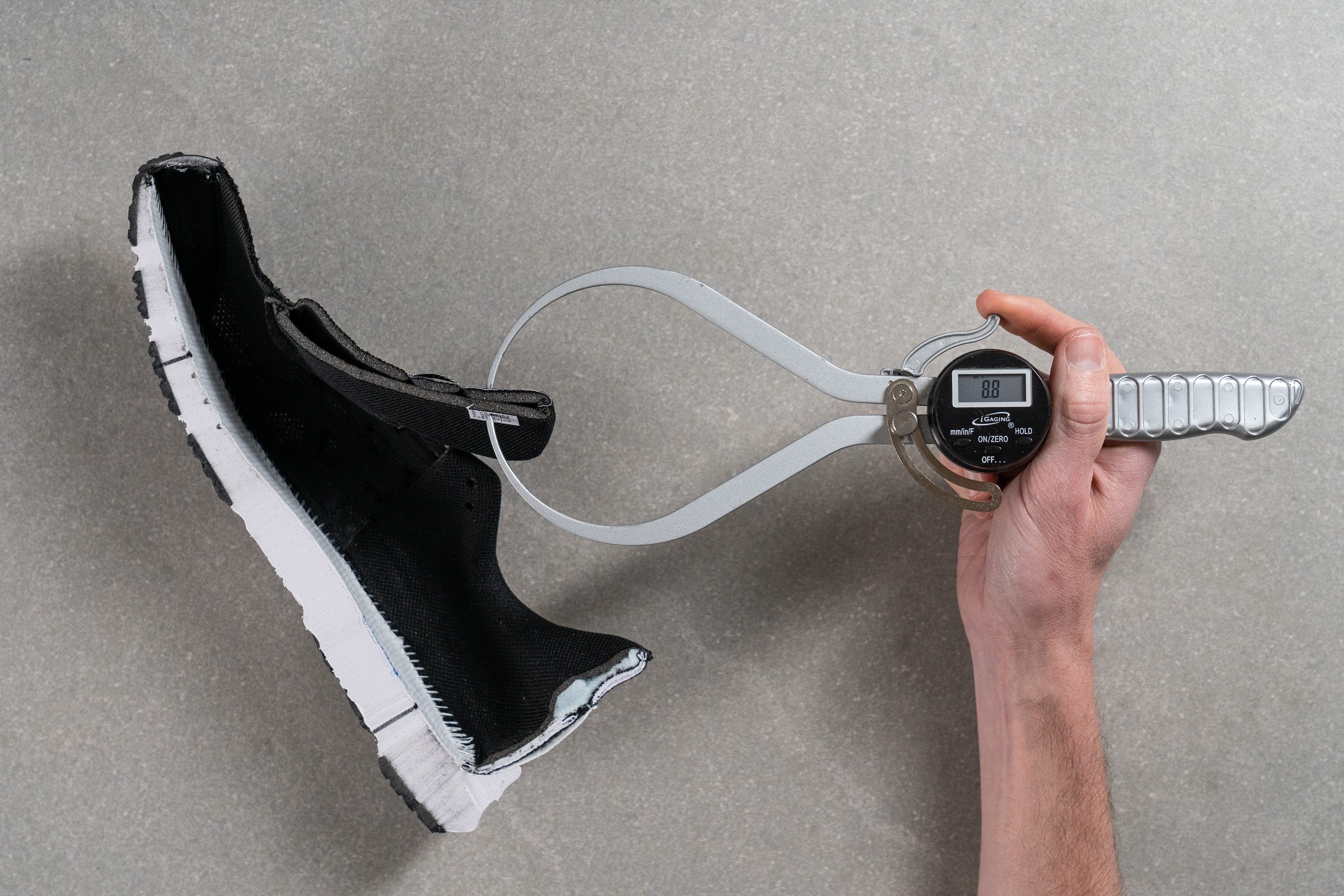
| Jolt 4 | 8.8 mm |
| Average | 5.7 mm |
Tongue: gusset type
The Jolt 4's tongue is non-gusseted so we did experience some slippage during testing, but this was mitigated by how chunky the tongue is which kept it from sliding too far to the side.
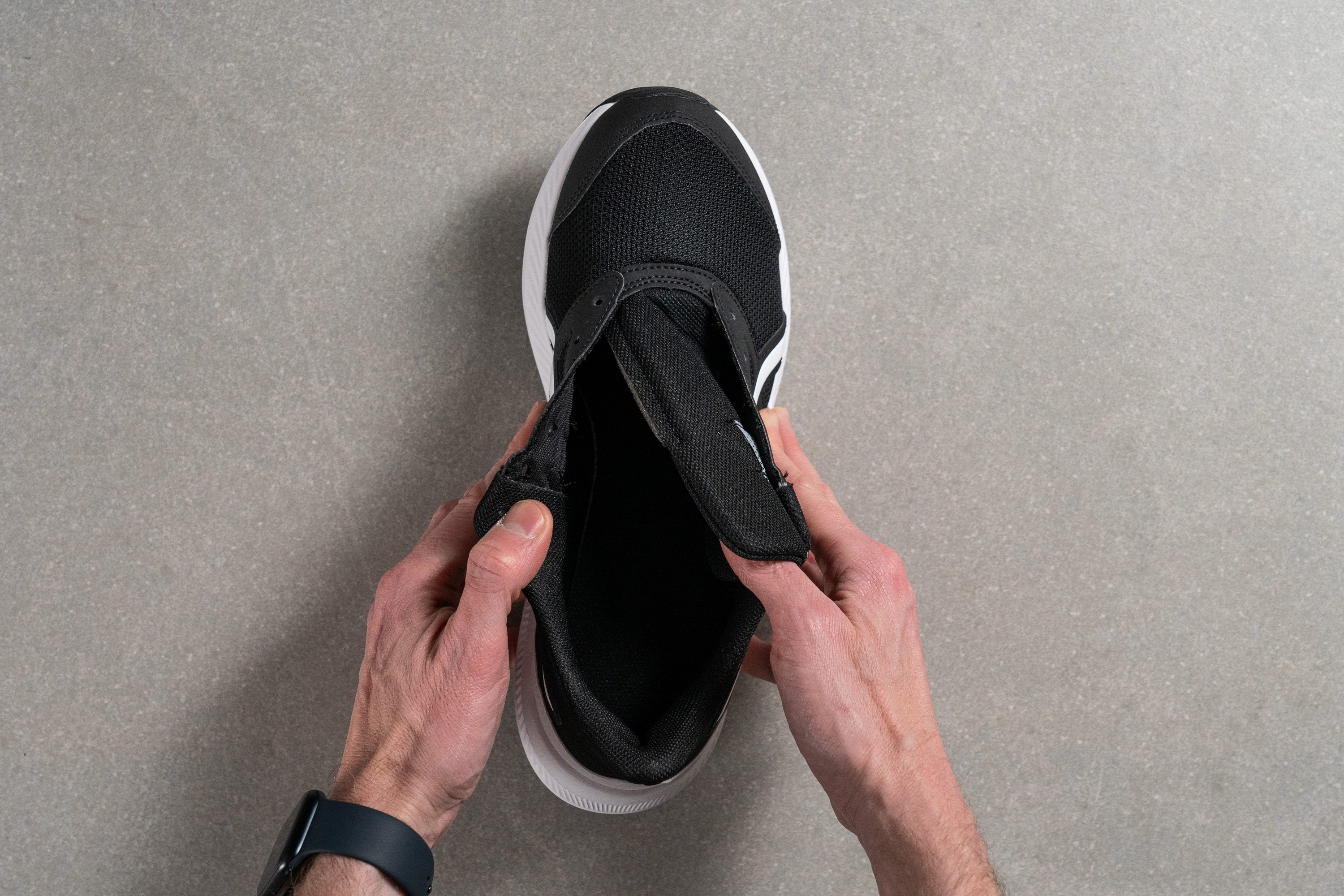
| Jolt 4 | None |
Heel tab
The Jolt 4 has an extended heel collar that can be gripped in order to slide the shoe on a little more easily.
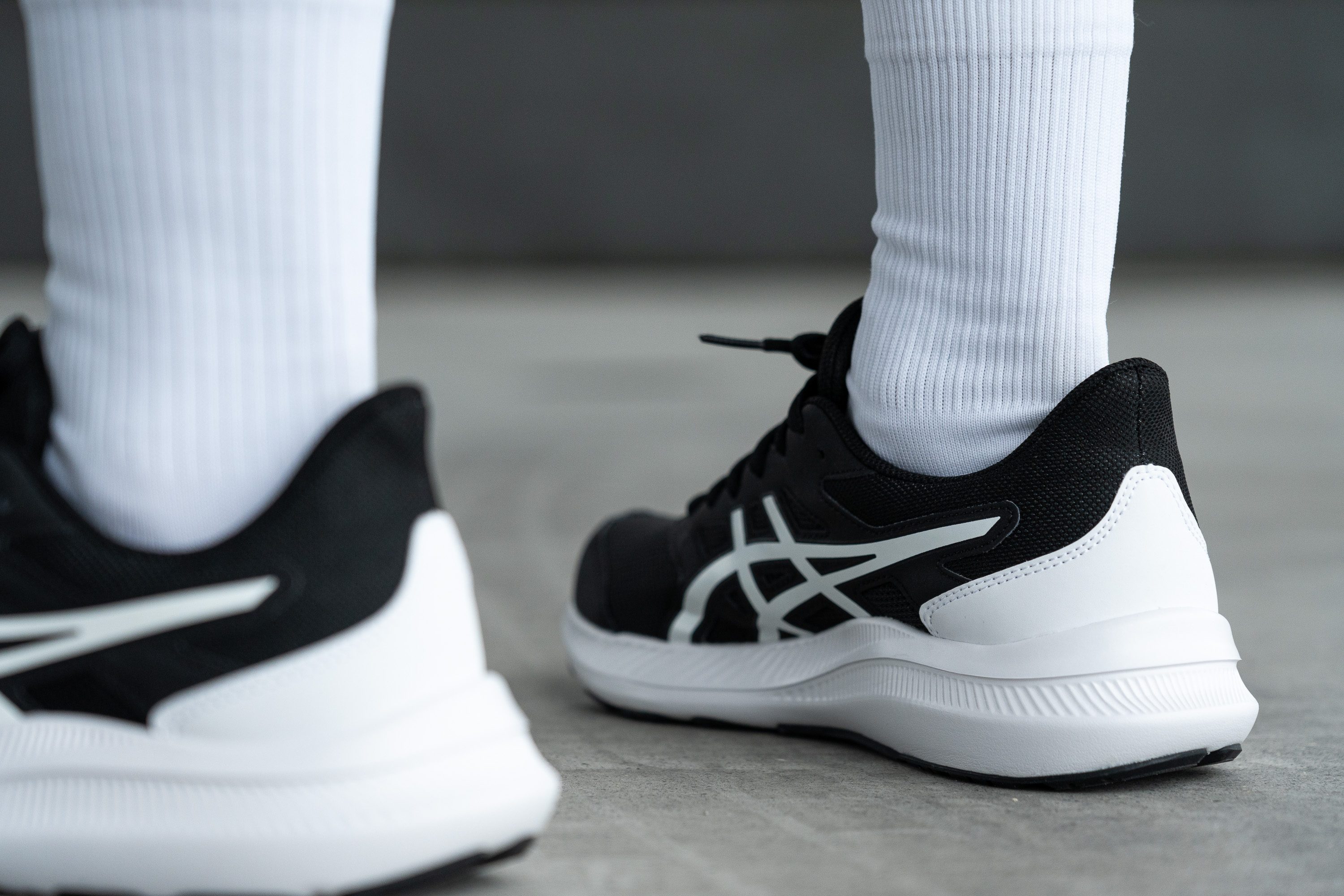
| Jolt 4 | Extended heel collar |

